
* A Distributed Proofreaders Canada eBook *
This ebook is made available at no cost and with very few restrictions. These restrictions apply only if (1) you make a change in the ebook (other than alteration for different display devices), or (2) you are making commercial use of the ebook. If either of these conditions applies, please contact a FP administrator before proceeding.
This work is in the Canadian public domain, but may be under copyright in some countries. If you live outside Canada, check your country's copyright laws. IF THE BOOK IS UNDER COPYRIGHT IN YOUR COUNTRY, DO NOT DOWNLOAD OR REDISTRIBUTE THIS FILE.
Title: Legendary Lore of Mackinac
Date of first publication: 1901
Author: Lorena M. Page (1863-1935)
Date first posted: Jan. 19, 2018
Date last updated: Jan. 19, 2018
Faded Page eBook #20180133
This ebook was produced by: Barbara Watson, David T. Jones, Alex White & the online Distributed Proofreaders Canada team at http://www.pgdpcanada.net

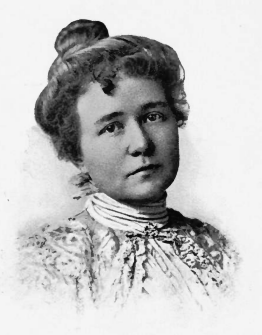
LORENA M. PAGE
Legendary Lore of Mackinac
Original poems of Indian Legends of Mackinac Island
BY LORENA M. PAGE
ILLUSTRATED
LORENA M. PAGE
Cleveland, O.
Copyrighted 1901
By Lorena M. Page.
PRESS OF
THE O. S. HUBBELL PRINTING CO.
CLEVELAND
“Tell me, ye winged winds, that round my pathway roar,
Do ye not know some spot where mortals weep no more?
Some lone and pleasant dell, some valley in the west,
Where, free from toil and pain, the weary soul may rest?
The loud wind dwindled to a whisper low,
And sighed for pity, as it answered—‘No.’
“Tell me, thou mighty deep, whose billows round me play,
Know’st thou some favored spot, some Island far away—
Where weary man may find the bliss for which he sighs,
Where sorrow never lives, and friendship never dies?”
—Charles Mackay.
The waves low murmur as they closer draw,
And pause, as they answer—“Yes, Mackinac!”
| PAGE. | |
| The Enchanted Island, | 13 |
| Past and Present, | 20 |
| The Wishing Well, | 21 |
| Robinson’s Folly, | 26 |
| Snow Islands (Les Chenaux), | 30 |
| Fairy Arch and the Giant’s Stair, | 37 |
| The Four Winds, | 42 |
| The Skeleton on the Stair, | 45 |
| Arch Rock, | 48 |
| Skull Cave, | 53 |
| The Twin Sister Rocks, | 61 |
| Nif-fon and Pe-bo-an, | 67 |
| Sugar Loaf Rock, | 71 |
| Love Song, | 75 |
| Hanging Rocks, | 78 |
| Scott’s Cave, | 85 |
| The Two Tall Pines of Piney Point, | 90 |
| Friendship’s Altar, | 95 |
| The Cold Spring, | 100 |
| The “Indian Pipes”—the Ghost Flower, | 103 |
| Lover’s Leap, | 107 |
| Devil’s Kitchen, | 115 |
| Sha-won-das-see, | 122 |
| Pontiac’s Lookout, | 124 |
| Indian Summer, | 130 |
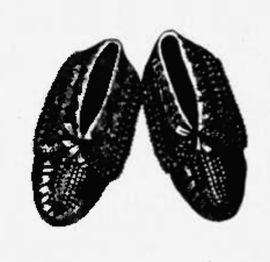
| PAGE. | |
| Moccasins, | 8 |
| Drawn by the author. | |
| Mackinac Island in the distance, | 13 |
| Photographed by Gardiner, Detroit and Mackinac Island. | |
| “A lone lodge,” | 16 |
| Photographed by L. Moorhouse, Pendleton, Oregon. | |
| Indian Papoose, | 18 |
| Photographed by L. Moorhouse, Pendleton, Oregon. | |
| Past, | 20 |
| Drawn by the author. | |
| Present, | 20 |
| Drawn by the author. | |
| Initial, | 21 |
| Drawn by the author. | |
| “Thou shalt see a noble warrior,” | 22 |
| Drawn by the author. | |
| “A canoe shot o’er the waters,” | 23 |
| Drawn by the author. | |
| The Fort, | 26 |
| Photographed by Rossiter, Mackinac Island. | |
| “He told all his love for her anew,” | 27 |
| Drawn by the author. | |
| Robinson’s Folly, | 28 |
| Photographed by Rossiter, Mackinac Island. | |
| Initial, | 30 |
| Drawn by the author. | |
| “The snow drifts piled deep ’round the lodge on the highland,” | 30 |
| Photographed by L. Moorhouse, Pendleton, Oregon. | |
| “They paused to listen,” | 36 |
| Photographed by L. Moorhouse, Pendleton, Oregon. | |
| “An Arch in the rock on an Island enchanted,” | 37 |
| Drawn by the author. | |
| “Twisted trees,” | 38 |
| Photographed by Rossiter, Mackinac Island. | |
| Leaning Rock, | 39 |
| “The rock-fashioned stairway,” | 40 |
| Photographed by Rossiter, Mackinac Island. | |
| “I know its wooded wiles,” | 42 |
| Photographed by Gardiner, Detroit and Mackinac Is. | |
| “The wreaths curl up from his queer red pipe,” | 45 |
| Drawn by the author. | |
| Initial, | 48 |
| Drawn by the author. | |
| Arch Rock, | 50 |
| Photographed by Rossiter, Mackinac Island. | |
| The Cave in the Wood, | 51 |
| Photographed by Gardiner, Detroit and Mackinac Is. | |
| “ ’Tis called Gitchie Manito,” | 51 |
| Photographed by Childs, Mackinac Island. | |
| “The small Arch where the fairies were hidden,” | 52 |
| Photographed by Foley Bros., Mackinac Island. | |
| The “Crack” in the Island, | 52 |
| Photographed by Gardiner, Detroit and Mackinac Is. | |
| Skull Cave, | 53 |
| Photographed by Wickman, Mackinac Island. | |
| “Here the Wind Bird fell with me,” | 56 |
| Drawn by the author. | |
| The Twin Sister Rocks, | 61 |
| Photographed by Gardiner, Detroit and Mackinac Is. | |
| “Two babies waiting, cosy and warm,” | 65 |
| Photographed by L. Moorhouse, Pendleton, Oregon. | |
| “When came the ‘Moon of Falling Leaf,’ ” | 66 |
| Photographed by Gardiner, Detroit and Mackinac Is. | |
| Sugar Loaf Rock, | 70 |
| Photographed by Rossiter, Mackinac Island. | |
| “The silver moon rising slowly,” | 73 |
| Photographed by Gardiner, Detroit and Mackinac Is. | |
| “Oh, maiden, give ear to thy lover’s voice,” | 75 |
| Photographed by L. Moorhouse, Pendleton, Oregon. | |
| Hanging Rocks, | 77 |
| Photographed by C. E. Kelso, Manistique, Mich. | |
| “He entered the cool and columned halls,” | 79 |
| Drawn by the author. | |
| “Through the bloom on every side,” | 86 |
| Photographed by Rossiter, Mackinac Island. | |
| “On its threshold cold fresh leaves were thrown,” | 88 |
| Photographed by C. E. Kelso, Manistique, Mich. | |
| “Against the bark she laid her cheek,” | 90 |
| Drawn by the author. | |
| Friendship’s Altar, | 94 |
| Photographed by C. E. Kelso, Manistique, Mich. | |
| “For here as the sun set they would meet,” | 100 |
| Drawn by the author. | |
| “Where paths were worn by the red man’s feet,” | 101 |
| Photographed by Rossiter, Mackinac Island. | |
| Initial, | 103 |
| Drawn by the author. | |
| “An Indian chief met my startled gaze,” | 104 |
| Drawn by the author. | |
| Lover’s Leap, | 107 |
| Photographed by Bell, Sault Ste. Marie, Mich. | |
| “So a chieftain shall I be,” | 108 |
| Drawn by the author. | |
| “It lit up the company gathered around,” | 115 |
| Drawn by the author. | |
| British Landing, | 116 |
| Photographed by Gardiner, Detroit and Mackinac Is. | |
| Block House, | 117 |
| Photographed by Gardiner, Detroit and Mackinac Is. | |
| “The monster boat will o’er us float,” | 119 |
| Photographed by Wickman, Mackinac Island. | |
| The old mission buildings, | 120 |
| Photographed by Gardiner, Detroit and Mackinac Is. | |
| “By the broad and deep lagoon,” | 122 |
| Photographed by Wickman, Mackinac Island. | |
| “A warrior looked across the strait,” | 124 |
| Photographed by Gardiner, Detroit and Mackinac Is. | |
| Chimney Rock, | 125 |
| Photographed by Gardiner, Detroit and Mackinac Is. | |
| Autumn Woods, | 130 |
| Photographed by Rossiter, Mackinac Island. | |
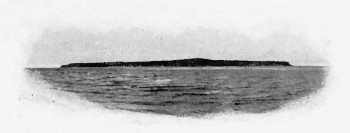
A lodge stood by the gleaming sea,
Stood close beside the shell-strewn shore,
Where breezes wafting wild and free
Could enter at the open door.
A light, not of the sun or moon,
Through all that clime of “Northern Lights”
More radiant glowed than fairest noon
O’er all the vales and rocky heights.
Two sea gulls, white as sea foam, sat
Upon a rock close by the door,
Where, flapping hung the braided mat
Before the lodge upon the shore.
The swaying mat was flung aside—
Emerging from the doorway low
There came a maid dressed as a bride.
And thoughtful was her step, and slow.
The beaded garments that she wore
Were made of choicest skins of doe,
Embroidered with the grace of yore,
And bleached as white as drifted snow.
The sea gulls skimmed across the tide,
Then turned and circled high in air,
Before they fluttered to her side
To nestle in her neck and hair.
“Ah, sea birds mine, I have you fast!
Will you seek out my new home tree—
Or, will you wander free at last,
Far out upon the changing sea?
Tell—will mine be a happy lot?
Can you birds of the wild deep say?
Or shall I long for this dear spot,
When I have journeyed far away?
You shall to me the secret give.
Now, from my shoulder skim the deep,
And I shall ever happy live
If you, my pets, together keep!
Now, let not one the other leave,
Fly east, or west, o’er shore or tide—
Stay close together or I grieve—
There, go! Why hover at my side?”
They circled slow on graceful wing;
They flew afar across the blue;
Then to the wave they seemed to cling,
But ever close together flew.
Then, rising, they would swiftly dip,
And turning they would dip once more—
Before they flew, wings tip to tip,
Back to the maid upon the shore.
She held them close; she kissed their breasts
Bejeweled with the dewy tide,
And failed to see the groom and guests
Until they waited at her side.
Nine sisters had Oweenie fair,
Who each a brave young chief had wed;
And as they all stood smiling there
Each to the other bent her head.
For envy rankled in each breast
Against this sister fair and sweet—
Had not their husbands with the rest
First groveled at her dainty feet?
Oweenie, queen of all that shore,
In beauty rare, and artless grace,
Had lovers counted by the score,
Who brought her trophies of the chase.
But from them all she coldly turned—
From lover shy and hunter bold,
And one and all she kindly spurned
To wed Osseo, bent and old.
They went along the shell-strewn sand
To where, within a tiny bay,
Were anchored close beside the strand,
Of birch canoes a grand array.
As Osseo came slowly on
He upward gazed with yearning eye,
As though the Evening Star to con
That glowing hung low in the sky.
At last was filled each birch-made boat
With stalwart men and women fair;
And, light as mist, they seemed to float
Among the lilies clustered there.
Down through those waters pure and deep,
And mirrored clear, there came to view,
Our own land in her virgin sleep;
Low down beneath the rippling blue.
They paddled o’er the waters far,
To where a lone lodge met their gaze,
Directly ’neath the Evening Star,
That on it shed its lambent rays.
It rested on a tiny reef,
And round its doorway flowers sweet
Of gayest hue and varied leaf
A carpet wove to meet their feet.
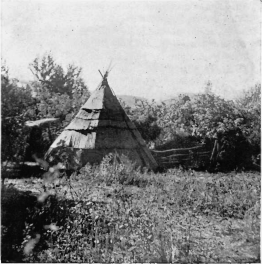
The boats were anchored on the shore;
The old man took Oweenie’s hand
With,—“Welcome to your new lodge door,
And to this spot—your husband’s land.”
Within a bounteous feast was spread,
A banquet laid for all the throng;
While faint, and far from overhead
Came music like a distant song.
When at the board they took their place
They marveled at the dainty fare,
And wonder grew upon each face
As clearer came the music rare.
Then spoke Osseo from his seat,
The while his eyes were cast afar,—
“All quaff a-deep for my bride sweet,
Oweenie, and the Evening Star.”
The drink a wild enchantment gave,
But emptied soon was every cup;
And though it held them like a slave
They drained it to its final sup.
Oweenie gazed at Osseo—
She saw a strange change cross his face,—
Saw line by line the old age go,
And youth and beauty take their place.
Still brighter grew the starry ray
And with it came a message strange:—
“You shall be fairies from to-day;
The spell is cast; behold the change!
The lodge is rising,—have no fear,
Shattered is all the evil spell.
Now all is well, the land is near
Where you, my children, are to dwell.”
Both bride and bridegroom heard the words
And, as they ceased, they turned to find
Their guests transformed to flitting birds
Of varied plumage, size and kind.
The lodge began to turn and rise,
And slowly lifted from the strand
Up toward the region of the skies,
And left the tiny reef of land.
As thistle down it seemed to float;
The lodge poles turned to golden wire;
The birds all joined with swelling throat,
A happy, care-free, feathered choir.
At last upon the starry plains
They drifted ’midst the music wild
Of captive songsters blithesome strains.
A voice then said,—“My well-loved child,
Hang there the cage of singing birds;
They mortal shapes shall ne’er resume;
They mocked your plight with sneering words,
From henceforth they their crests may plume.
Within this land there’s naught to dread
Save that lone star whose evil spell
Was cast upon your youthful head,
When you, its victim, downward fell.”
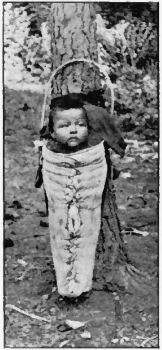
The seasons passed, and to the pair
In that bright land, a son was born;
With flashing eyes and tawny hair
And face as radiant as the morn.
His father made for him a bow,
And fashioned it with art and skill;
But, there was neither game nor foe
Within that realm to hunt or kill.
So opening the gilded cage
He freedom gave the captive band,
That darting through the foliage
Rejoicing flew on every hand.
With well-taught aim the archer gay
An arrow sent with studied art;
It sped, too true, upon its way,
And pierced a songster through the heart.
And as the blood dropped on the sand
It banished all the magic spell;
And, one by one, they left the land
That seemed receding as they fell.
Swift, and swifter grew their flight
Through regions of the clouds and air!
They missed the road of “Northern Light.”
And downward sped, they knew not where!
They reached at last the “Spirit Road,”
The bright and shining milky way
That upward led to fair abode.
But still their course they could not stay!
At last below there came in sight,
A waste of waters, far and wide,
Where flitting sped two sea gulls white
Close skimming by each other’s side.
And then a tumult stirred the waves—
A moving object in the blue—
And, rising slow, from hidden caves,
A monster turtle came in view;
And, drifting high it resting lay
Surrounded by the waters deep;
And there it floating lies to-day,
The “Turtle Island” still asleep.
Here landed all the fairy train
That fell adown the “Spirit Road,”
And here contented they remain,
For they made this their charmed abode.
The sea gulls’ flight ’tis said was true,
For still they dance and sing each night
When moon and stars in waters blue
Reflect their rays in dreamy light.
The birds sing while the fairies sleep.
The daylight hours they thus beguile,
On the turtle lying in the deep,
The fair “Enchanted Northern Isle.”
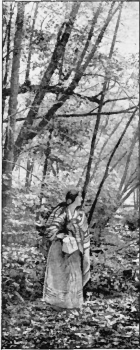
She walked along a winding trail
With free and lithesome tread.
Beside the way grew a daisy pale
With dainty sun-crowned head.
She did not know it told the tale
Of a maid that was to come—
With hair of gold and a face so pale,
Who would o’er the Island roam.
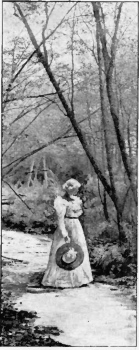
The seasons passed and the other maid
Strolled along a wide road-bed;
When, nodding bright, in a pine-tree’s shade
She espied a lily red:
It told her not with its dusky glow
Of the maid of other days—
Who followed the trail so long ago
Through all the deep by-ways.
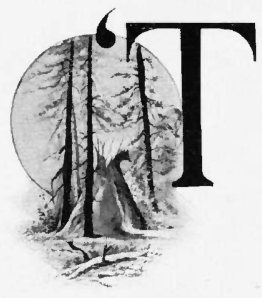 was in the distant Northland
was in the distant Northland
Where the “Sweet-Sea-Waters” flow,
That there dwelt an ancient prophetess
In her wigwam, long ago.
Deep stood her lodge in the shadows
’Neath the pine trees’ sombre shade;
To the braves, she was a councillor,
And brewed love charms for the maid.
It was at the close of summer,
And while darksome stood the pines,
The gay trailing robes of autumn
Lay on shrubs and clinging vines.
Beside her lone gleaming camp-fire,
Where the glowing embers lay,
In her wigwam knelt the sorceress
On the eve of this autumn day.
Without was the dark night silent,
Save an insect’s chirping cry.
Or the call of ko-ko-ho-ho
As he slowly fluttered by;
While within, upon a bear skin,
By the lodge fire’s ruddy glow,
Knelt Moned Kway the prophetess,
Slowly swaying to and fro.
But the insect’s cry was silenced,
And the night bird’s call was still,
As a twig was snapped asunder
On the footpath down the hill;
Then, a ray of light shot outward
Piercing deep the shadows dim,
As a maiden entered the wigwam
Of the prophetess so grim.
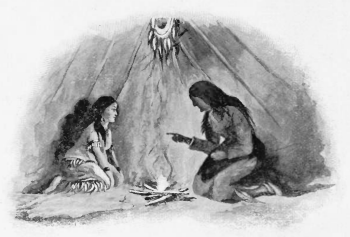
She stood in the ruddy firelight,
And poised as though seeking flight
To the thickly gathered darkness
That lay in the outer night
On the coals a charm was brewing,
As the conjuress chanted slow,
“I am here as you bid, Oh Noko!”
Said the maiden speaking low.
“Ah yes, you have come, Awanda,
As I bid, one moon ago;
Now kneel on this robe of magic,
This bear-skin as white as snow.
Kneel there while I brew the potion
That will bring you love and power;
Thou shalt see a noble warrior
At to-morrow’s sunset hour!”
They knelt on the skin of magic,
Till at last the charm was done.
Then thus spoke the ancient prophetess:
“To-morrow, at set of sun,
Seek thou the ‘Enchanted Island’
That lies out there in the sea,
Then, if thou follow my bidding,
A lover will come to thee.”
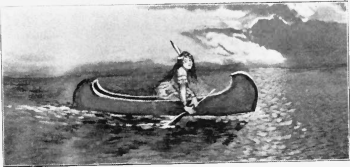
So when next the sun sank lower,
And crimsoned all of the west,
A canoe shot o’er the waters,
With a maid upon whose breast
Lay the potion of the sorceress—
The charm of old Moned Kway:—
She paddled across the waters
Where the “Magic Island” lay.
At that very hour, a warrior
From a distant noble band,
Walked over an unknown Island
Far to Southward from his land.
And, just as the sun was sinking,
He let swift an arrow fly,
And shaped his course with the arrow’s
As it cleft the crims’ning sky.
He walked through bright groves of beauty
Where leaves fluttered gaily by,
He searched out the hidden songster
With a glance of piercing eye.
On, ever on, he still wandered,
Led thus, by some unknown spell,
Till, near the shore of the Island
He came to a Crystal Well.
On the brink a maid was kneeling—
His arrow lay at her side;
And he heard her softly murmur—
“Oh, Well—in thy sparkling tide
I will pour my precious potion—
May my wishes granted be,
That here in thy limpid waters
My own warrior’s face I see!”
Then into the Well of Crystal,
Fell the drops of deepest blue,
From the hand so lithe and slender,
Of a dusky, tawny hue.
All the glancing birds were silent
And the falling drops he heard—
For a moment wid’ning circles
In the mystic depths were stirred.
He looked in the shining waters
For her lover mirrored there;
But he saw her face of sweetness
Framed deep in her raven hair.
She beheld his dark face glancing,
Completing the magic spell!
And thus the spot gained its title
Of “The Island’s Wishing Well.”
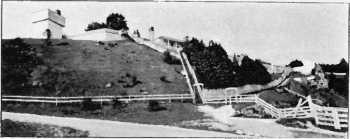
When puckwees roamed the tangle of the forest
And all the day birds fluttered out of sight;
When Michilimackinac began to lie in shadow,
And the dews falling, whispered of the night;
When Man-i-to the Mighty came from seaward
To land upon the Isle at set of sun—
Then, from the old rugged fort on the headland,
Walked Robinson as boomed the sunset gun.
He stepped forth and took a trail to the westward,
And walked as o’er a well remembered road;
Going swiftly till he came to a wigwam
Made of birch, where a camp-fire glowed.
A vision flitted toward him in the shadows,
A maiden clad in skins and breasts of birds,
A daughter of the Red Chief of the forest
How she drank in the nectar of his words.
And, there sitting hand-in-hand by the camp-fire,
He told all his love for her anew;
How he’d build them a wigwam of deer skins,
On the highland where the tamarack grew.
Thus he sat there and told her of the future,
The story lending magic to the place,
The blazing camp fire lighting up the thicket,
And resting on her trusting, dusky face.
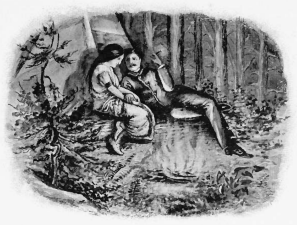
He told her he must travel to the Southward,
Calming all of her silent grief away:—
Morning came, and he sailed o’er the waters,
And was gone many a long and weary day.
When his vessel came again to the landing,
She was standing on the high cliff alone;
But his white youthful bride was beside him,
And she waited as if turned into stone.
But he built for her the wigwam of deer skins
On the headland overhanging the sea,
That murmured forever its sad sweet song
In a chorus with the tamarack tree.
But she roamed like some haunted restless spirit
The dense woods, and the deep tangles through,
When the moon went sailing high in the heavens,
And the leaves were all dampened with the dew.
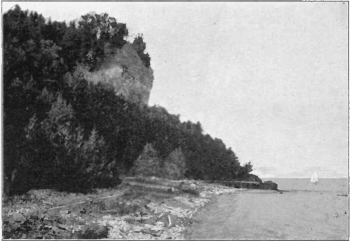
Thus, she met him one evening in the shadows,
As he took the new pathway down the steep;
And she pleaded with wild love and abandon,
That he one of their old trysts would keep.
Then she would leave Michilimackinac forever,
And journey far to Northward with her tribe;
She embraced him and besought him so madly
That he promised and accepted her bribe.
The night came, and with it came a tempest,
The forest shook and quivered in the blast,
The lightning cleft the darkness like a dagger,
The thunder rolled, like cannon, thick and fast.
And Robinson went slowly up the incline,
Toward the headland that overhung the sea;
Went along like a spectre in the darkness,
And paused beneath the tamarack tree.
Then the wigwam flap was slightly lifted
As by the restless sporting of the storm;
And he called her name softly in the darkness,
Which jealously concealed her nut-brown form.
As there came a vivid flash from the westward,
Followed closely by an awful rending shock,
He saw her sitting ’bove the wild sea beneath
On the brink of the over-hanging rock.
Her black loosened hair was wildly streaming,
A love light shining madly in her eyes;
Her bare arms were out-thrown for embracing,
He saw when the lightning rent the skies.
He rushed madly toward the bluff—perhaps to save her,
As the storm shook the Island with its shock!
She clasped him tight round the neck ’midst her kisses
And with him plunged headlong from the rock!
As the tempest died away toward the eastward,
The morning came with sunshine for the land.
Do ye hold them close, oh restless billows?
Or are they sleeping on the damp sea sand?
They searched the wild waters, and the mainland,
And they traced all the rugged Island shore,
But Robinson and the Indian maiden
Have never been heard of more.
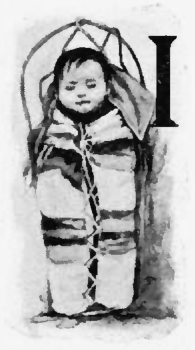 n a point of the wood where the trees thickly clustered,
n a point of the wood where the trees thickly clustered,
There stood a lone lodge high up from the shore;
Around its low doorway the winter winds blustered,
While ice fields muffled the loud breaker’s roar.
The sharp blinding snow came in flakes fine as powder,
And tossed by the wind it drifted up high;
Pe-bo-an, the Cold god, raged fiercer and louder,
Mantling the landscape and hiding the sky.
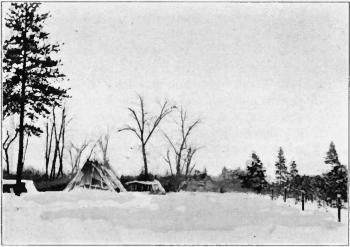
The snow drifts piled deep round the lodge on the highland,
And sifted through cracks to the earthen floor;
The cold was intense on Michilimackinac Island;
It entered the lodge through the low bear skin door
And strove to extinguish the fire burning brightly,
But it only leapt upward to ruddier glow.
Here gathered the household of Wawatum nightly
While trees cracking with frost, swayed to and fro.
For days had Wawatum through snow that was blinding,
Gone to his traps vainly seeking for food;
And, tramping till weary, but empty snares finding,
Would take his way home through white pathless wood.
For days had he sought through the ice crystal towers,
To see if a fish had strayed into some net,
Where through holes in the ice ’midst frost-fashioned bowers
His nets clever woven he deftly had set.
Thus he, day after day, no fish or food bringing,
Would seek his lone lodge and little bronze brood,
Who close round his knees would come climbing and clinging,
All vainly clamouring after their food.
He noted the embers lay glowing for roasting,
Placed by the mother for fish or for game;
He stood thoughtful among them no trophy boasting;
Thus hunger, silent, and stealthily came.
He took off his snow shoes; he threw on fresh fuel;
And gathered his small brown children around;
Then to make them forgetful of hunger so cruel,
He told them tales as they sat on the ground.
Each dark little face would then slowly grow brighter
As he told them about the robin red;
The lodge fire leapt higher, the wigwam grew lighter
And winds swept high in the trees overhead.
He told how I-a-dil-la, a youth of great beauty,
Was forced by his father a long fast to take;
How for twelve weary days—as was a son’s duty,
Not once in the time his fast did he break.
How his father then sought him dainty food bringing,
And found him painting his breast a bright red,
Ere he swiftly took flight, in gay freedom winging,
And he, the first robin, sang overhead.
He told that the raven had once in its beauty
Been white as the snow drifts out in the night;
But for evil deeds and neglect of his duty,
Black grew his beautiful plumage of white;
For he was captured, was this fellow so craven,
And securely bound in a hollow tree,
And smoked, and smoked, was this white saucy raven,
Till he was the blackest bird they could see.
Told how Man-i-boz-ho, who once illy faring
At the hands of evil Man-i-to,
Was helped by the wood-bird with greatest daring
And together they slew the evil foe.
And with the red blood of the Man-i-to flowing
Man-i-boz-ho painted the wood-bird’s head;
And ever since that day, so gaudily glowing,
The wood-pecker’s head has been flaming red.
The children sat silent; the embers sank lower—
He told them of Weeng, the small god of Sleep;
The dark mother swayed the papoose ever slower,
That swinging smiled in its slumbering deep.
He told them how Weeng at that moment was creeping
And tapping, tapping, on each little head;
And thus they forgot all their hunger in sleeping
And warmly were tucked in their deer skin bed.
At last a morn came when the snow had ceased falling,
But was drifted high round wigwam and tree;
And it seemed to Wawatum he heard a Voice calling
’Mong the castles of ice that covered the sea.
So donning his snow shoes he silently followed
Down the steep hill in the fresh morning air;
Down where the snow drifts were swept out and hollowed,
He walked toward the crystalized city fair.
On, he went through the transparent glimmer,
Where ice-gems hung from the mimic frost trees;
Where pinnacles towered and frost flowers shimmered,
He followed the call that came on the breeze.
The sun rising lit up the turrets and towers
With lilac, and orange, and crimson, and gold;
There were mountains of glass, and valleys, and bowers;
Far stretched this beautiful city of Cold.
After long weary miles he reached icy highlands,
And heard the strange Voice ring out overhead—
“I, the lone ruler of the Les Chenaux Islands,
Bid thee to hearken!” the hidden voice said.
Wawatum obeying, sank kneeling and listened
To the Voice that rang on the morning air,
While round in the sun rays glimmered and glistened
The wide spreading Frost-land so gorgeous and fair.
“Wawatum, Wawatum—put down thy mush-ke-moots;—
Obey, and thou shalt have plentiful store;
Down at thy side where the tall crystal pillar shoots
And fill them with ice from the transparent floor;
And thou shalt have fish from the caverns deep-hidden,
Where muscalonge, trout, and pickerel are found.
Wawatum, Wawatum, now do as I’ve bidden!”
“Wawatum, Wawatum” echoed around.
The great sacks were filled with the ice hard as boulders,
All now was silent, the echoes had died;
But Wawatum stood list’ning ere to his shoulders
He lifted the sacks that stood by his side.
“Wawatum—now hearken—as home you go weary,
And heavily burdened with your great load,
The way that was light will seem sombre and dreary;
Voices of evil will follow your road.
“But go on unheeding; ’tis but the wind sighing;
And as you travel the long homeward track,
Keep ever straight forward, nor list to their crying;
Remember, Wawatum, to never look back.
Now hasten, Wawatum; there is danger in staying;
In the sacks close-filled will plenty be found;
Hasten, Wawatum—never felling nor straying.”
“Hasten, Wawatum;” then came back the sound.
Wawatum went onward, his heavy load bearing,
Toward home far away on the “Turtle Isle”;
And as he went forward ne’er heeding nor caring;
Voices of evil assailed him the while.
The bright sun was hidden, and gone was the glisten;
Strange whispers there were most dismal to hear;
The shadows grew deeper; he could not but listen
To sounds of anger that fell on his ear.
The Ice City shook; he rushed on nearly falling;
On, ever on, o’er the long homeward track;
There were sounds like thunder, and strange voices calling!
He had to leap many widening crack!
The pinnacles seemed to be moving and swaying!
On, on he sped toward the “Big Turtle’s” shore;
It seemed that the winds were intent on his slaying
So wild their storming with buffet and roar.
Why wrathful the North Wind that rules the White Region—
Kab-bib-bon-o-ka, the North Wind bold?
Now hark! From the Southward the voices are legion;
The South Wind is coming to battle the Cold.
On comes Sha-won-das-see! The discord increases!
The castles and turrets crumble and crack!
The Wind battle rages; the tumult ne’er ceases!
On flies Wawatum, not once looking back!
At last in the distance, his own Island seeing,
He hastening onward reaches the shore;
Like demons pursuing a foe that is fleeing,
The cries of the Wind rulers shriek on the more!
Then pausing in safety, a backward glance taking,
He sees the Old South Wind gain on the foe;
Sees the City of Crystal falling and breaking;
Then sees it move seaward silent and slow.
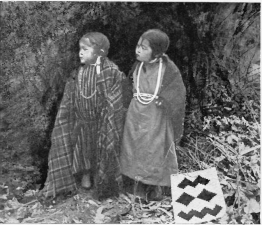
There was feasting that night in Wawatum’s dwelling
From fish in the bags—a bountiful store;
But they paused to listen—he of ice floes telling,
And the Voice he heard on the Snow Island’s shore.
The North Wind was conquered—the South Wind was master—
Vanished all hunger and hardship and snow;
And Wawatum thankfully saved from disaster,
Remembered the Voice on the Les Chenaux.
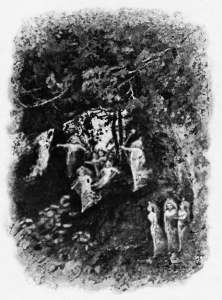
An Arch in the rock on an Island enchanted,
Where gee-bies meet nightly and dance hand in hand;
It cannot be seen from the high cliffs above it;
’Tis hidden from sight as you walk on the sand.
This home of the fairies ’mid cedar and pine,
Is a rift in the rock, all draped with the vine.
Here they guard the great Stairway that passes their door—
The long “Giant Stair” leading up from the shore.
As fishers pass home with their boats in the night,
They have oft’ seen them dance in the pale moon-light.
The giant Unk-ta-hee with storm seeks the landing,
And tries amidst tempests the high cliffs to reach;
But fairies above in their grotto are watching
To drive this old ruler safe back to the beach;
For, if he once reaches the top of his Stair,
He will claim for his kingdom this Island so fair;
He’ll drag her, his captive, ’neath waters so deep,
And there he will hold her, forever asleep.
So the fairies are ever guarding her there,
In the rift at the foot of the “Giant Stair.”
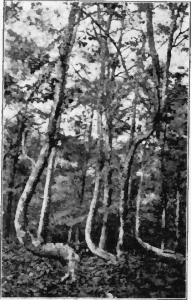
Unk-ta-hee, the ruler of all the great waters.
This Island once held in the cool limpid deep;
But a great turtle rose with it on his shoulder
One day when Unk-ta-hee lay calmly asleep.
Arose in the midst of the “Sweet Sea Waters,”
With the fairest of all old Unk-ta-hee’s daughters,
As she rose from the deep, he woke in his wrath,
And twisted trees and rocks in his rushing path;
Then he tore out the steps of the “Giant’s Stair”
Over which to recover his Island fair.
When dew-drops are falling and stars are a-twinkle,
And Unk-ta-hee slumbers with scarcely a sigh,
Then the gee-bies, the puck-wees and in-in-ees frolic
And dance ’neath the Arch when the moon sails high.
But when he awakens with rush and with roar,
With help of Key-bey-un to buffet the shore;
Key-be-un the sire of the Four Winds strong—
The lightning, Ge-bang-ge-mon, bringing along,
Then the moon slips under the clouds in affright,
And sounds of the tempest ring out on the night.
As Unk-ta-hee mounts up the rock-fashioned Stairway,
The sprites open a cave deep hidden from sight,
Where, stored by the in-in-ees, puck-wees and gee-bies,
Is a treasure of burrs from the pine tree white.
Then the strongest among them all pelt him sore
As he strives to rush high from the rocky shore;
They carefully aim for his white foamy crest,
And of all known weapons white pine burrs are best;
They aim for his crest—his vulnerable spot,
And until he is conquered they weary not.
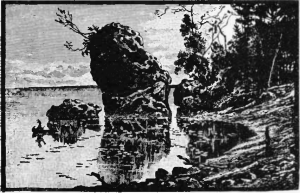
Key-bey-un surrenders, the keen lightning follows,
And Unk-ta-hee cowers a poor beaten thing;
The fairies have driven him back to his kingdom
With none to caress, but the fleet sea-bird’s wing.
Then should you go silent along the wet sand,
You’ll hear their gay song as they dance hand in hand;
You’ll hear dainty music, soft tinkle and swell
From the “Arch” in the rock where the gee-bies dwell.
If you pause by the “Stairway” passing their door,
You may hear their words floating down to the shore.
We come by the light of the fire-fly’s lamp—
We the fairy band;
When we hear the beat of the wood-tick’s drum,
To guard this enchanted land.
We come from the East, the North, the South,
We the fairies small,
When the moonbeams glance, and the stars peep out,
And the night birds lonely call.
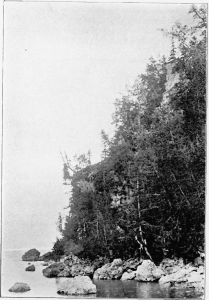
Some come o’er the tide from their caves of pearl,
In a tinted shell;
Some woke from their dreams in a cobweb swing,
And some in a lily bell.
Some come from the groves of Main-to-wak,
Hid in shadows dim;
Where they slept all day on the tufted moss
’Neath a tall fern’s bending limb.
We put on our armour—the pinch-bug’s shell,
We donned our shields so small,
And each took a lance tipped with honey-bees’ stings,
And answered the wood-tick’s call.
We put on our helmets—the acorn’s cup
And quickly flew away,
To dance and sing in the “Fairy Arch”
Till the dawning of the day.
Our Sleep god Weeng bids all creatures rest,
We our guard will keep,
’Neath the “Giant Stair” of the “Fairy Isle”
While all mortals sweetly sleep.
We come by the light of the fire-fly’s lamp—
We the fairy band;
When we hear the beat of the wood-tick’s drum,
To guard this enchanted land.
I know an Island beautiful, that, like a jeweled pin
Binds the Northern Lakes together as the robe of mandarin.
I know its rugged headlands, and I know its wooded wiles
Where the perfume of the forest the shaded path beguiles.
I know each height and cavern, where an old time legend sleeps,
I know the winding pebbled shore where shifting wind gust sweeps.
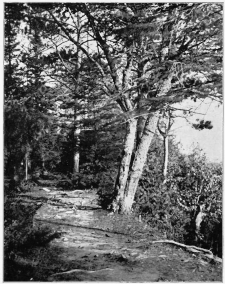
I know that on this Island fair, the breezes always blow,
From north, or south, or east, or west, like welkin overflow;
And I’ll tell to you the reason why they never are at rest,
But speed, with quickly changing course, across the Island’s breast;
For perchance, you may have wondered at their frolic or their sweep,
As they toyed with you or buffeted, on headland, shore or steep.
’Tis said that every Northern Lake is ruled by Monarch bold,
Who, high above his watery realm, lives throned in clouds of gold;
While in the balmy Southland, the lagoons and sweeping bay
Are ruled by another Monarch who holds dynastic sway:
And these Rulers are all brothers—Key-bey-un is their sire,
And, like to Rulers here below, new realms are their desire.
So forth one hurls a mighty weight through another’s fair abode,
Who grasps it firmly as it flies and returns the rasping goad.
’Tis caught again, and thrown with skill to the Southlands far away
Where the Southern Ruler languid lies above his sleeping bay;
He, rising, blows with ardent breath, and back the missile sweeps,
Then dropping down in cloud-made couch, again he soundly sleeps.
Thus, back and forth, from north to south, and east to west, the fray
Sweeps ever above the Island that lies beneath the way;
The gem that binds the Northern Lakes of the brothers’ fair domain,
And catches the breath of missiles within the cloud-made plain,
And I know no fairer spot than this Isle like a jeweled pin
That binds the Lakes together as the robe of a mandarin.
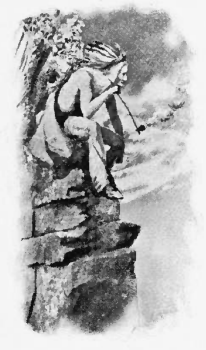
Scenting the breath of the fresh morning breeze
That ’mongst the branches plays,
Comes the spicy odor of dark pine trees
Through all the cool byways.
Another breath—I pause beside an oak
As borne on the air comes a whiff of smoke.
I part the leaves, and to my searching gaze
Appears a red man, old,
And through the calumet’s dim smoky haze,
His keen eyes I behold
Fixed on me. He sits on the headland where
Falling cliff on cliff is the “Giant’s Stair.”
I join this scion of a vanished type,
With withered face so brown;
And wreaths curl up from his queer red pipe,
There on the Island’s crown.
And through the smoke, in retrospective haze,
He recalls to mind the departed days.
“You ask of my pipe—my old calumet—
That I smoke here to-day;
Bedecked with a scene of the chase, clear cut,
Deep in its rich red clay?
From the red pipestone quarry,” the old man said,
“Came all of the clay for the peace pipes red.
“Above the pipe quarry, in days of old,
Two great tribes fought and bled,
And their blood soaked down through the cold damp mould
And colored the pipe clay red.
This pipe was tinted in that old affray
When the blood ran down and painted the clay.
“Then the Great Good Master of Life was sad
To see the peace pipe red;
And he called the tribes of his children bad,
And turned away his head.
Never since that time have we seen his face,
And his people became a fallen race.
“You ask why I sit on this summit’s tip,
Here by the ‘Giant’s Stair?’
What my eyes behold toward the wave’s low dip
Over rocks so rough and bare?
My treasure once lay on a ledge below,
In the moons gone past, in the long ago.
“The fairest of all, in the long gone day,
The moons so cold and dead,
Was the old Chieftain’s daughter, Fayaway;
Raven her dusky head,
Her face like the snow on the mountain side,
And her cheeks like the glow at eventide.
“But Pau-guk called; on the ‘White Spirit Road’
Wandered her silent tread;
And gone for all time was the light of day,
For Fayaway was dead.
Four nights on her grave the death fire I made,
And watched till the dawn when the bright stars fade.
“Her grave, over there where her people lay,
Seemed not for me alone;
So I took her up, and carried her here,
And then she was my own.
For hours I toiled in that long night of woe
To lower her down to the ledge below.
“Then no one save me knew the place she slept;
No one could touch her grave;
Then here on this spot my lone watch I kept,
Above the ‘Fairy Cave.’
The breeze by day bore my love from the height—
And waves repeated it through all the night.
“Into forest trees have the saplings grown,
My people passed away;
Like a birch tree old, on a mountain lone,
My hair is bleached and gray.
Soon will my moccasins follow the trail
Where the waters swift will my bark assail.
“Many moons ago did the stranger white
Ascend the mighty steep,
And, gaining the ledge of the dizzy height,
Disturb my Loved One’s sleep.
And they bore her away, I know not where,
From the ledge in the rock-made ‘Giant’s Stair.’
“You ask why I sit on this summit’s tip,
Here by the ‘Giant’s Stair?’
What my eyes behold toward the wave’s low dip
Over rocks so rough and bare?
My treasure once lay on a ledge below,
In the moons gone past—in the long ago.”
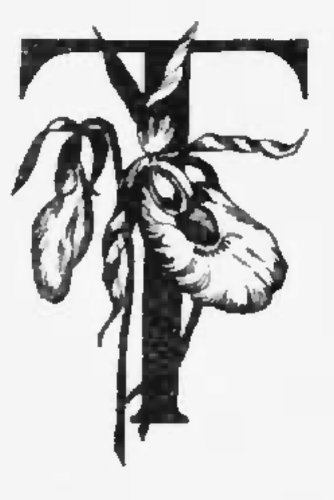 here’s an Isle far away, where blue straits lie gleaming—
here’s an Isle far away, where blue straits lie gleaming—
An emerald set in the deep;
Where dark pine trees murmuring low in their dreaming,
A legend repeat in their sleep.
They whisper of days when the great giant fairies
Danced over this fair “Turtle Isle,”
With slippers as bright as the sunshine that tarries
And glints through the green with its smile.
They tell of the great Gitch-ie Man-i-to Master
Who strayed through the heights in the wood;
Who, by his wise words, saved his race from disaster,
This ruler, so mighty and good.
They moan in repeating how one day he vanished
And never was heard of again;
How the spell was broken, and how he was banished
Evermore from the sight of men.
For far in the land of the “Wild Roaring Water,”
Sailed a vessel upon her way;
From above the Falls where dwells Old Eagle’s daughter,
Known as “Maid of the Mist” to-day;
Across the blue waters of Erie then speeding
She entered the river so wide,
Where the wild fowl fluttered, and shy deer were feeding,
Where Detroit now rests by its side.
And, sailing she came to the great “White Wood Island,”
Past St. Clair, Huron, and Thunder Bay;
And, rounding its foot, a bright green covered highland
Off across the blue waters lay;
’Twas the Island of Magic—Michilimackinac sleeping,
Undisturbed by even the waves;
And strangers had ne’er through her forests gone creeping,
Nor entered her crystalline caves.
The great giant fairies o’er mosses went hieing
Through fretwork and fair filigree;
And some lost their slippers of gold in their flying
To caverns deep under the sea.
Should you go through the shadows deep in the tangle,
Along the precipitous way,
You’ll find them hung ’long the cliff side’s steep angle,
Where they dropped them that long vanished day.
Gitch-ie Man-i-to went with giant tread marching
For the grottos under the Isle—
To his doorway, where still the rock framework is arching
Above the debris in a pile.
Here he paused for each giant fairy to enter
Through the small Arch down near the shore,
Ere the keystone he wrested from deep in its center—
And closed was the Man-i-to’s door.
Now listen again to the pines in their sighing,
And they’ll tell you how on that day,
The white strangers hastened, the fair Isle descrying
From their boat anchored down in the bay;
How, just as their feet touched the beautiful Island
The earth of the “Great Archway” fell;
Thus shutting forever the door ’neath the highland
Where fairies and Man-i-to dwell.
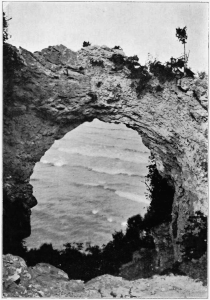
You may still find the mark where this ruler was standing—
Man-i-to, mighty and good;
Where he threw down his pipe ere the strangers made landing,
And tore out the “Cave in the Wood.”
And its weight was so great, that the rocks split asunder
And cracked the whole Island in two;
The white men mistook the low rumble for thunder,
And round them the wild sea-birds flew.
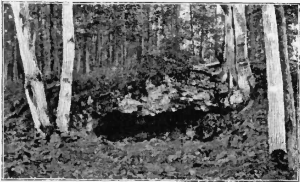
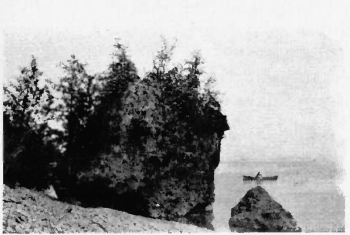
Should you visit this “Isle of the Giant Fairies”
And pass Gitch-ie Man-i-to’s door,
Where much of the charm of the past day still tarries,
The keystone you’ll find on the shore.
You’ll know it from boulders that lie there all scattered—
’Tis called “Gitch-ie Man-i-to.”
It rests down below the “Great Archway” so shattered,
Where he threw it long, long ago.
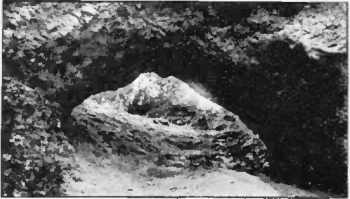
You’ll see the small Arch where the fairies were hidden
When the strangers came on the shore.
Should you wander alone, they’ll come if they’re bidden
And tell of the charmed days of yore.
Or, they’ll lead you deep through the woodland’s dim arbor
Where, the “Cave” and the “Crack” are to-day;
Where the peace pipe was thrown when into the harbor
Came the “Griffin” upon her way.
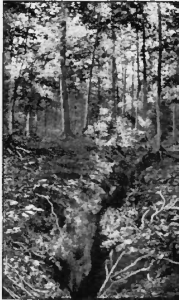
Should you miss them, the pine trees low in their dreaming
The legend repeat in their sleep,
On the Isle far away where blue straits lie gleaming,
An emerald set in the deep.
They whisper of days when the great Giant Fairies
Danced over the fair “Turtle Isle,”
With slippers as bright as the sunshine that tarries,
And glints through the green with its smile.
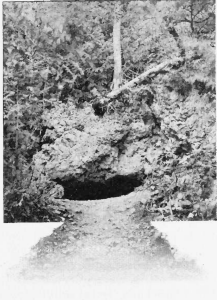
Many days had raged a tempest
And the sea with waves ran high;
None could brave the angry breakers
But the kay-oshks sailing by,
Dipping in each angry billow
As it strove to reach the sky.
None could go into the forest
Where the tempest reigned alone;
Twisting mighty trees like grasses,
Till with many a creak and moan,
Parting from the earth that held them,
They fell downward with a groan.
Fishers sat unwilling idlers
Listening to the ceaseless roar.
Hunters saw, with fears of hunger,
Slowly melt their laid-up store;
Still the forest shook and trembled,
Still the breakers beat the shore.
Slowly famine sought the village;
Still the tempest’s wrathful cry.
Each divided with his neighbor.
Still the waves ran fierce and high,
And through all the groaning forest
Naught was heard but moan and sigh.
All the people met in council,
And the oldest of his race
Thus addressed the gathered warriors:—
“Every one is in his place,—
And, my children, we are starving;”
Ghastly showed his withered face.
“Many moons I roved the woodlands;
Many moons I skimmed the tide;
Many moons I climbed the yo-nond
Ere you children at my side
Came into this land of shadows—
Let my message be your guide.
“In the Northland sits the Wind Bird,
On the last edge of the world;
There is calm and peaceful weather
When his great strong wings are furled;
But when flaps his wings in anger
Then the hurricane is hurled.
“Someone now must travel Northward
And do battle with this Bird;
For he fans this forest whirlwind;
By his wings these waves are stirred.
We are starving! We must battle!
I have spoken,—you have heard!”
’Mong the warriors was Mes-sog-won.
As the old man took his place,
Tall, he rose among his fellows
Determination in his face.
“This same day I go to Northward—
I, the strongest of my race.”
The third day after he had journeyed
Great calm settled on the land;
Tempests sank to murm’ring zephyrs;
Ripples kissed the gleaming sand,
Fishers fished, and hunters hunted;
There were fish and meat at hand.
Three days more, and came Mes-sog-won;
His keen, flashing eyes were dim.
He was bent and bruised from battle,
Scarred of face and weak of limb.
Joyous was their hearty greeting,
Welcoming and feasting him.
Then he spoke,—“Oh, listen, brothers,
I the mighty Wind Bird found
Far away up in the Northland,
On a high and rocky mound.
Then began a long fierce battle—
I conquered him, and left him bound.
“When first he saw that I was master
And closely to him did I cling;
Thinking he would thus escape me,
He cleft the air with sudden spring
And o’er the waters toward the Southland
Sped with me on sweeping wing.
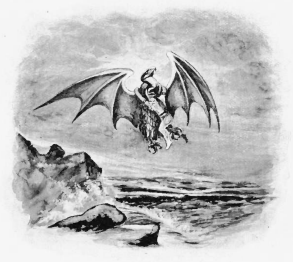
“On he flew, but ever slower,
Ever closer to the sea,
Till I saw down in the waters—
An Island strange, it seemed to be—
An island like a monster turtle;
Here the Wind Bird fell with me.
“Downward toward this “Turtle Island;”
I trembled, though you call me brave,
Fell down, and down, until we landed
Beyond the reach of stilling wave.
Broken was one mighty pinion.
Here I left him in a cave.”
Days passed by, the sunshine lingered;
Not a ripple curled the sea;
Woodlands stood in calmest grandeur,
Not e’en a zephyr fanned a tree.
Fishers gathered stores of plenty,
Game was found through wood and lea.
Peace and plenty filled the village,
In they gathered bounteous store;
Waters lay like gleaming mirrors,
Circled by the reed-fringed shore.
Days and weeks the calm continued—
Such calm ne’er was known before.
Then a murmur slowly started—
Scums were forming on the tide;
Leaves were withering in the woodlands,
One by one the streamlets dried;
O’er the surface of the waters
Fishes floated where they died.
Sickness grew upon the people;
Came no clouds, nor freshening rain;
Waters in the lakes grew stagnant.
Far abroad o’er wood and plain
Search for pools or springs of water
Nearly always was in vain.
People once more met in council,
Came the old man through the door;
Thus he spoke:—“Go to the Island
To the ‘Cave’ up from the shore—
Mend the pinion of the Wind Bird.”
Then, dying, sank upon the floor.
That same day two daring warriors
Started for the Island “Cave,”
Far across the stagnant waters.
From that day was neither brave
Ever heard of in the village.
Did they till an unknown grave?
Sickness grew, and many languished;
Others started from the shore
For the “Cave” upon the Island;—
Never were they heard of more.
People longed to hear the tempest,
And the breakers on the shore.
Then Mes-sog-won, now grown stronger,
Still bearing many a mark and scar,
Came and walked down toward the water
And his eyes were cast afar.
And he said,—“I go to Northward!
Fare ye well, I go to war!”
The third day. The people waited.
Would their waiting be in vain?
Others lay and moaned in anguish—
Hark! A breeze sweeps wood and plain.
Waters stir, the scum floats seaward;
Moving clouds bring cooling rain.
There is joy and great thanksgiving—
People send forth grateful praise.
Streams burst forth, the wavelets ripple;
There are bright and perfect days.
“Mes-sog-won comes! All hail Mes-sog-won!”
Is the cry the people raise.
His hand is raised bidding silence,
And he speaks: “No praise is due,
For I have not been in danger.
The story I will tell to you:—
I journeyed to the “Turtle Island”;
Slowly near the ‘Cave’ I drew.
“The great Wind Bird sat there unmoving
Where the shadows deeply cling.
Without pause the ‘Cave’ I entered,
And then said:—‘I healing bring—
I, the one who broke your pinion—
I have come to mend your wing.’
“When I bade him move it gently,
Breezes in the trees I heard,
And I saw that I was master
Of this great and mighty Bird.
Still his strong wings moved he gently;
Ripples on the sea were stirred.
“Then I peered deep in the shadows,
And, upon the cavern stones,
I saw gleaming in the darkness
Bleaching piles of human bones,
And me-thought I heard repeated
Echoes of their silenced groans.
“That is where our people linger,
Near the softly swelling wave;
Those who traveled to the Northward
There lie in one common grave.
Those who sought and found the Wind Bird,
Silent lie within his ‘Cave.’ ”
Mes-sog-won from that day was master
Of the Bird that ruled the air;
Peace and plenty filled the wigwams.
When white men found the Island fair,
The Wind Bird flew, none knew whither;
Only bleaching bones were there.
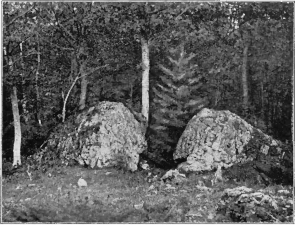
The glowing embers failing asunder
Conquered the shadows with cheery light;
What mattered the storm, and the rumbling thunder?
Within there were no cares to cumber—
They were banished outside with the night.
A woman sat there, gay beads entwining
With sinews and thongs of the brightest hue;
And happy the thought in their designing,
And some loved destiny their assigning,
If one could fathom the dark face true.
And over across the embers gleaming
A flashing light caught the ruddy glow,
Like lightning entrapped and held there dreaming,
A glint from the sky where shafts were streaming;
’Twas a blade flashing to and fro.
Under the knife blade’s shining reflection
The wood fell away with each stroke keen;
A cradle small was nearing perfection,
And tiny the child for its protection
By its length could be plainly seen.
At last the foot board was all perfected,
For the little feet a needed rest;
An arching hoop was firmly connected,
For by its strength the child was protected
When put in its moss-cushioned nest.
The woman then the small cradle holding,
Arranged all its trappings one by one.
Bound on a blanket with careful folding,
With bead-wrought bands that she had been moulding,
And the rude little cradle was done.
After the storm, with a smile of pleasure,
The sunlight greeted the waking morn.
And, Man-i-to, with a lavish measure,
Had left at the lodge a double treasure,
For a pair of twin babies were born.
E’en in our time it is sometimes vexing
To know in the start just what to do;
In the small lodge it was sore perplexing
How to manage the double annexing
Of the little papooses two.
Not the single suit with bead-wrought tracing,
Nor the cradle just fashioned for one,
Were the troubles that the pair were facing;
For twins were believed the most disgracing
Of endowments under the sun.
And vain they knew would be the dissuading,
Should the chief learn of the little pair;
The cruel law there seemed no evading
By interdiction or bold persuading.
To be killed upon birth was their fare.
After much thought a plan was perfected,
And one little papoose was to die,
Before the tribe the two had detected,
It only remained one be selected,
But how equally balanced the tie.
Day after day from the deed refraining,
They tried to pick from the rival twain,—
Who had learned to smile, and uncomplaining
Awaited the cast of their ordaining—
The child that should with them remain.
No need of choosing one or the other,
For some one approached the wigwam door
And entered—the truth they could not smother,
There were the babes and devoted mother,
And the twins were a secret no more.
From lodge to lodge the report went speeding,
Of the gift of the evil Man-i-to;
The chieftain harkened, and quickly heeding
He hastily came, all the others leading,
To free themselves from this sign of woe.
Then up he spoke to the gathered faction—
“To-night the father must both twins slay.
From this decree there is no retraction.
Then for deceit and long-delayed action
He must journey from this land away.”
The morning dawned with rose colour creeping;
In the early flush the couple stood.
Silent they waited, their lone watch keeping,
Between them two mounds, rounded and heaping,
Scarred the face of the fair sleeping wood.
When the tribe came, still no murmur making,
They saw them loosen a mighty stone,
Then another that set the earth a-shaking
As on they pushed them rolling and quaking,
One on each little grave to be thrown.
This task completed, the tribe departed,
All save the old chieftain so stern,
Who stayed to see their long journey started,
The woman sad and the man weak-hearted,
And to bid them never return.
They turned alone, a winding path taking
To the trail that led down to their boat;
Through dim alleys where song birds were waking,
They reached the shore as daylight was breaking,
Where most of their goods lay afloat.
Here by the water silently standing,
No sound was heard but a singing bird.
Into the boat that lay on the landing,
Their few small burdens silently handing,
They still uttered never a word.
Then in the thicket stealthily stealing,
They each emerged with a little form;
The rising sun the secret revealing,
That shadows dim had been concealing,
Two babies waiting, cosy and warm.
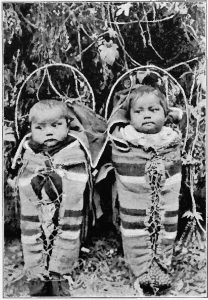
Then off o’er the deep, faster and faster
To pitch their lodge on some distant strand;
There to live free, with no one their master;
There with their children safe from disaster;
Far from the spot where the great Rocks stand.
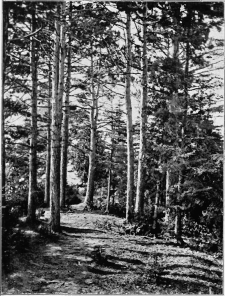
How sad and drear, to Nif-fon’s grief,
Appeared the lands of her domain,
When came the “Moon of Falling Leaf”;
How tarnished were the wood and plain
Where blooming verdure once had lain.
Her garments, that a glowing green,
Had trailing swept the sylvan glade,
Were lacking now in brilliant sheen
Of blended shades in rich brocade,
Like vestments of a past decade.
She sighed for happy vanished days,
When Sog-a-tun sent balmy showers,
And song birds told their mating lays,
While Se-gwun wooed her decked in flowers
Through gaily speeding, gladsome hours.
She left her lodge of dying vines,
And took a path that led away
Beyond the bound of her confines,
Toward realms of Northern Lakes and Bay
Where cold Kab-bib-bon-ok-ka lay.
Far on the road great mountains high
Rose up like giants bold and stern,
And from her breast escaped a sigh—
She strove in vain to swift return,
But forced was now her sad sojourn.
Her garments faded, and her hair
So sunny turned to bleaching gray;
She seemed impelled by some strange snare
That forced her on along the way
With failing steps and no delay.
The heights she saw were fields of snow,
The lakes like wastes of crystal stone;
She staggered on with footsteps slow,
Until at last, fatigued and lone,
She slow approached Pe-bo-an’s throne.
He wooed her in her dire distress
With icy touch of frost and sleet,
Until she sank ’neath his caress,
His victim, at Old Winter’s feet—
Wrapped closely in his winding sheet.
And there he kept her till one day
When Sog-a-tun, the warming rain,
Descried her lodge in disarray,
All bleached and battered on the plain,
When seeking out her old domain.
He called the East and West Winds wild,
To rise and follow on her trail;
He called the South Wind, strong but mild,
To haste, and snow and ice assail
In Winter’s rugged coat of mail.
And Winter sent the North Wind out
To meet the onslaught on the plain;
With sleet and snow he planned the rout,
But all his storming was in vain—
They deluged him with melting rain.
And Nif-fon rousing from her sleep,
Awoke with rain upon her face;
With tattered garments trailing sweep
She sadly turned her path to trace
With drooping mien and deep disgrace.
And as she went along the way
Her garments bright and brighter grew,
While sunny locks replaced the gray.
The verdure sprang, her feet to woo—
Her face regained its youthful hue.
At last in old-time dainty dress,
She, led by Se-gwun, walked again
Through blooming realms that with caress
Rejoiced to meet her gladsome reign,
And bid her welcome to the plain.
But from that absent fatal day
When Summer in her discontent
Wandered from her land away,
A part of all her years are spent
In regions cold for punishment.
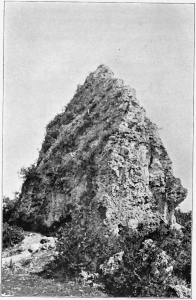
SUGAR LOAF ROCK.
Six trav’lers came o’er the waters
And drew their canoes on shore;
Then went o’er a path, deep winding,
To the mighty Man-i-to’s door;
To the lodge of Man-a-boz-ho;
To his wigwam of pointed rock.
The boldest stepped to the opening,
And gave a resounding knock.
“Who comes to disturb my quiet
When the sun is shining high?
I cannot give you my council
Till the moon tips cedars high.
But, go to the point I bid you,
And there, three times touch the rock,
And regale yourselves on honey
Until I my door unlock.”
Then, the hidden voice was silent;
And they went as they were bid;
And all feasted on the honey
In “Sugar Loaf Rock” deep hid.
They feasted till the daylight
Paled in the dark’ning west,
And the moon rose like some spectre
And tipped bright the cedar’s crest.
And, as she rose in her fulness,
And complete shone on the night,
The curtain of rock was lifted;
Man-a-boz-ho came in sight.
Saving,—“One by one, ye mortals
Who come from over the sea,
Step forward and name thy wishes,
And they shall be granted thee.”
Then up stepped the first one ’mong them,
A tall stripling, scarce a man,
And the blood of youth was flushing
All his beardless cheek of tan.
“If it please thee, Mighty Spirit,
The good promise to me give,
That I may have game in plenty;
The allotted lifetime live.”
His companion, standing by him,
Said—“Give me a mighty name;
May I win in all the battles;
Man-a-boz-ho, give me fame.”
“To you both I grant your wishes;
For thou a long life shalt live;
And thou shalt win fame in battle,
For I have the power to give.”
Then there came another forward—
“I’m chief of a noble race.
May I do my duty by them
And forever hold my place.”
And the next one to petition—
A fisher of low degree—
Said—“Grant me an abundance
Of the fishes of the sea.”
Then did Man-a-boz-ho answer—
“It shall be as you both wish,
For thou shalt remain a chieftain;
And thou catch thy share of fish.
But there’s two who have not yet spoken,
Step forward and state thy plea,
And whatever be thy longing,
It shall be granted to thee.”
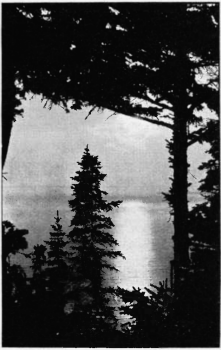
Then up came the boldest ’mong them
Saying—“Mighty One, do-give
And grant me this humble blessing—
That I may forever live.”
His companion stepped beside him
And said—“Thou of magic name,
Who canst give to us our wishes,
Wilt thou grant to me the same?”
The silver moon rising slowly
Shed abroad her beaming light
As the voice of Man-a-boz-ho
Rang out on the stilly night.
“Thy wishes also are granted.
Both now harken well to me!
Thou shalt be a senseless boulder,
And thou a gnarled cedar tree!”
They tried to rush from his presence;
But the one congealed to stone;
The other rooted to the spot,
A cedar tree weird and lone.
All the others fled to seaward
And left that enchanted spot;
The cedar with arms out-reaching,
Far over a lime-stone rock.
Should you travel to the Northward,
To loiter the time away,
You’ll find them just as on that night
In the self-same spot to-day.
And if on some moon-lit evening,
You on Man-a-boz-ho call,
Be sure in making your wishes,
To have them extremely small.
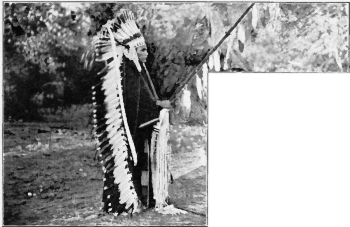
Oh maiden, give ear to thy lover’s voice,
Hark to his ardent persuading plea;
He roams alone through the shadows deep,
All of the village is fast asleep;
The moon hangs low o’er the distant sea.
He sues for a seat in thy wigwam small—
The place of choice by thy waiting side;
List to the wish that his words express:
Oh, rouse from thy mat of drowsiness
Bid him to enter and there abide!
Bright flowers he’ll find thee in hidden glade,
Berries he’ll gather from tangled height;
Nuts he will pick from the frosted trees,
And seek for the stores of honey bees
As offerings, all for thy delight.
He will search on the shore for agates gay
To wear as tokens about thy neck;
He will bring thee a pair of scarlet wings
To bind in thy hair with wampum strings,
And softest skins to thy form bedeck.
Into the hands of thy lover so true,
The lakes and woods shall yield their store;
He’ll gather them all to lay at thy feet,
If thou grant to him the chosen seat
And list to the wish his words implore.
The moon now is fallen, the air is chill,
Silenced are all the birds of night.
Ah, wilt thou not heed his pleading song?
Still dost thou dream, and his suit prolong.
Waken—and put all his doubts to flight.
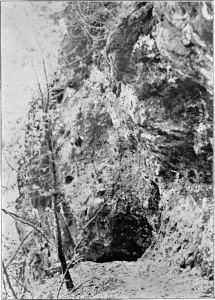
His birch-craft sped with the paddle’s turn,
Wielded with skill at the chemaun’s stern,
Fleet as a bird on its southern flight
Nor swerved a hair to the left or right.
It stirred the blue into wid’ning wake,
That, falling back, curled the mirrored lake.
The air was sultry, close and warm,
And the youth read signs of coming storm.
His course lay off toward an Island high,
Whose towering cliffs against the sky
Were crowned with juniper, birch and pine,
All laced with creepers and clinging vine.
The spot was enchanted, his people said,
And none dwelt there but the sleeping dead;
But the daring youth knew naught of fear
And laughed at their words with scoff and jeer.
Onward he paddled and gained the beach;
He drew his boat from the water’s reach,
Then, walking along the rock-strewn shore
Where foot had perchance ne’er trod’n before,
He came at last, ’midst the boulders rough,
To an open way leading up the bluff.
Pursuing this, and gaining the height
There the lake, far-reaching, lay in sight.
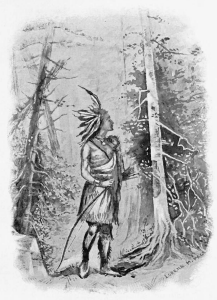
Here leaving the crags, like castle walls,
He entered the cool and columned halls
Where mosses vied with tendrils sweet
To trim the shade at the forest’s feet;
And the trunks up-rising straight and high
With worlds of leaves screened the glowing sky,
Till scarcely a glimmer reached the bed
Of pine needles, soft beneath his tread.
On, on he went through the shadows dim
Hoping to follow the Island’s rim,
And all of its coast to closely trace
Until he came to his starting place.
Nor could this stripling with bold heart guess
The charm of this untrod wilderness,
Where warriors, hardened in strife and chase,
Cared not its secrets to boldly face.
Nor did he credit the oft told tale
Of fairies’ fall down the “Spirit Trail”;
Nor the Turtle’s rise from hidden caves
Saving them thus from the waiting waves.
But he hastened on through shadows deep
Where the trees were waking from their sleep
And with rising sigh and swaying form
Awaited the rush of the coming storm.
He passed where rested the sleeping dead
’Neath birchen lodges above their head;
Each small roof pierced with a rounded hole
For ceaseless flitting of restless soul.
As the wind increased, he crossed the height
Till the great “Stone Wigwam” came in sight;
But tightly closed was the stone-wrought door.
So he sought for shelter along the shore.
The clouds hurried past; the darkness grew;
While the wind swept fierce, and screaming blew;
And each writhing tree, with low bent crest,
Moaned and lamented with strange unrest.
Tracing the cliffs, high up from the shore,
Where the waves now beat with deafening roar,
The youth found a passage leading down
Where the rocks hung close with sombre frown.
He traced the ledge ’round a jutting crag,
And hanging low, with threatening sag,
Were monster rocks like a giant’s tower
That locked the ledge with menacing lower.
Down through the pines beat the booming wave;
High in the wall yawned an open cave.
As shelter was still his needed quest,
He clambered up to this eyrie nest.
Up, over surfaces rough and bold,
With but clefts and cracks his grasp to hold;
He finally reached the cavern small;
Below writhed the forest, dark and tall.
Here, secure from the rushing storm,
Completely sheltered, and dry and warm,
He prepared to wait, and resting lie
Till tempest and storm should pass him by.
How long the waiting he never knew,
Ere close to his side a sound there drew,
And he heard a voice his own name call
From solid rock in his cavern wall.
And, there behold, a beautiful maid
Emerged, as the rock seemed to melt and fade
Like mists at morn, when the sun aglow
Rises and scatters them to and fro.
“Arise, and follow!” commanded the maid.
“Ah, come, daring youth, art thou afraid
Of the first maiden who casts a smile
At thy brave face on the ‘Turtle Isle’?
Now take no thought of the frowning rock;
Follow, it cannot thy pathway block!”
She led him forward through caverns gray,
Till they reached a grotto’s bright survey.
A blazing fire lighted all the place,
And brightly shone on an old man’s face,
Whose glance discerning the youthful pair,
He signaled them to approach the glare.
“Welcome, brave youth,” was his greeting mild.
He turned to the maid, “My fairest child,
Are your brothers seen in the outer world,
On wings of the rushing tempest hurled?”
“Be patient, Father, I’ll look once more:
I found this youth at the cavern door,
And I failed to look at the wind-swept sky
Where storm and tempest are rushing by.”
The stripling watched the beautiful maid
Till into the shadows she seemed to fade;
Then turned to inspect the keen old man
Who appeared his innermost thoughts to scan.
“She is, brave youth, an enchanting maid;
You show to me you are not afraid
To join my sons in their daring tasks,
She shall be yours, as your bold heart asks.”
Into the cavern through solid rock,
Came clanging footsteps, with jolt and shock.
Four youths approached in sombre attire,
With blades of lightning, that quenched the fire.
Standing alone in the murky shade,
The maiden seemed waiting, half afraid.
The youth bent low ’fore the agéd sire
Saying—“Test me, is my desire;
And whatsoever the task may be
That thy sons perform on land or sea,
I am ready to join with all my skill,
To win from you, Chieftain, your good will.”
“My daughter, bring from the rock ledge there,
A pair of wings for this youth to wear;
And you, my son, fetch a gleaming blade,
For the youth bold, who is not afraid.
All’s now ready, you have but to fly
After my sons ’cross the wind-swept sky
And wield your blade with the thunder’s crash,
Or scatter clouds with the lightning’s flash.”
His wings were the black of the thunder cloud,
And as he stirred they muttered aloud;
A bolt from the sky, his knife blade keen
That filled the cavern with pallid sheen.
With eyes of beauty the watching maid
Forbade him to pause or be afraid.
Into the rocks turned each stalwart son;
The task of the daring youth is begun.
They reached the cave in the outer height,
And in the darkness prepared for flight;
For the day had passed, and the midnight black
Lay spread over all the storm-tossed track.
The sons stirred their wings—the thunder crashed!
They waved their blades—and the lightning flashed!
Outward they sped at an eagle’s pace
And the youngster followed into space.
Off, towards the south, past the Island’s shore,
Their bright blades flashed to their black wing’s roar.
Past clouds they dashed and the lightning hurled;
Then swiftly dashed down to wind-swept world.
The trees they uprooted as they passed,
Or left them shattered with swift blade cast.
But still ever on o’er the lurid way,
The brave youth followed as fleet as they.
They rose again to the upper world,
And from side to side their white shafts hurled
In a flashing ball game fierce and wild
That cleft the clouds in the darkness piled!
A keener flash set the gloom alight,
Sped by the youth in his sweeping flight,
And with severed wings through murky air
Downward he fell, he knew not where.
He roused at last in the cavern small
Where the maid had led through the solid wall;
It was not night, but declining day,
Fading slow to twilight, soft and gray,
He rose and sought for the passage dim,
Where he had followed through pathways grim,
But closely fastened was every side;
Away in the west the tempest died.
Deep in the forest an Ice Lodge stood,
Where the wind with piercing cry,
Through burdened trees of the crystaled wood
That quivered beneath its snow-made hood,
Went bitterly sweeping by.
In the lodge, where dying embers lay,
An old Chieftain dozed alone;
But the sound of the wind upon its way,
Driving the storm through the forest gray
Smote his ears with sombre tone.
His locks were white as the snow, wind-swept,
And trembled his withered frame.
But a sound above the tempest crept,
Arousing him as he languid slept
Beside his expiring flame.
And to the lodge of the Chieftain hoar
Came a Youth with buoyant tread;
In his hands sweet grasses he gaily bore,
And redolent were the robes he wore
And the flowers upon his head.
“Welcome, my son!” said the Chieftain old,
Come, enter and smoke with me.
Hast thou been far from my land of Cold?
Come, tell of thy deeds so manifold
And I’ll do the same with thee.
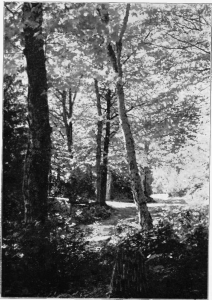
Then he drew from his sack a pipe of clay,
And lighted the contents mild;
The smoke ascending in curling sway
Encircled his features old and gray,
And the Old Man proudly smiled.
“I blow my breath and the lakes stand still—
The waters become like stone:
I shake my locks and on vale and hill
Come showering down the snow-flakes chill
Like a robe of whiteness thrown.”
“I breathe,” said the Youth, “and spring the flowers
Through woodland and over plain;
When I shake my ringlets come warming showers;
The streams awake in their hidden bowers
And go murmuring free again.”
“At my command,” then the Old Man said,
“Fall the leaves and drift away;
The birds fly Southward in fear and dread,
The animals hide in their moss-lined bed;
No one dares to disobey.”
Said the Youth—“When songsters hear my voice
They gather from far and wide,
And in wood and glade they all rejoice,
To follow my footsteps is their choice,
Through the bloom on every side.”
While they talked, the sun rose in the sky
Sending out his warming rays;
And singing sweet on the lodge poles high,
Two rival song-birds sought to vie
In their trilling roundelays.
The Old Man tried to complete his tale,
But drowned were his sombre words;
For waters burst through their coats of mail,
The flowers sprang up along the trail,
And forth came the forest herds.
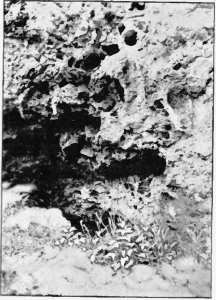
And slowly he faded before the gaze
Of the youth so young and gay—
Se-gwun the bringer of bright spring days,
Se-gwun who decked all of Nature’s ways—
After Old Pe-bo-an’s sway.
When full day-light entered the Ice Lodge dim
And sought ought the Chieftain old,
He sat by the ashes cold and grim,
Withered of face and wasted of limb—
Pe-bo-an the Ice King cold.
Se-gwun scattered blossoms far and wide
Through all the fragrant wood;
He looked at his work with happy pride,
And naught marred the view but the Ice Lodge wide
Rising close to where he stood.
He breathed—it turned to a mighty stone,
With a nearly-melted door;
The trees budded out above its cone,
On its threshold cold fresh leaves were thrown,
The Lodge was a blot no more.
In later times, in the fragrant shade,
When strangers discovered the place,
The Lodge of Pe-bo-an within the glade,
Moulded by Se-gwun to never fade,
They named it for one of their race.
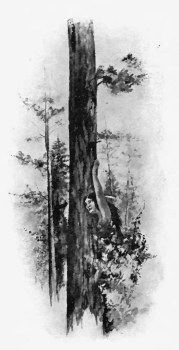
Gay laughter rang upon the air,
From blithe young braves and maidens fair;
The sport ran high and louder grew,
And round the circle how they flew;
The breath of pines was in the air,
And all was mirth and laughter there.
All? There was one with languid eye,
With sober lips that sadly sigh;
She moved with untaught native grace,
A look of sadness on her face.
The brave beside her bent his head,
And gazing at her, quickly said—
“Oh, laugh, Lee-lin-au, and be gay,
To-morrow is our wedding day.”
The game went on, she drew apart
With tearful eyes, and heavy heart.
What mattered all her grief and tears,
Her earnest prayers and silent fears;
The chief, her father, sternly said
That on the morrow she must wed—
Must wed this son of a distant chief
And took no heed of her silent grief.
She sought the lodge, the game went on;
There lay the clothes that she must don
To-morrow on her wedding day!
Outside how bright the laugh and play!
With wild rebellion in her face
She rushed from out the mocking place
To a weird spot far from her home
Where stood a pine tree, tall and lone,
That towered far above the rest
Upon the hilltop’s highest crest.
Here, pausing faint, forlorn and weak,
Against the bark she laid her cheek,
And murmured—“Oh, my tall pine tree,
To-morrow must I go from thee;
From home and people go afar
Where stranger tribes and people are—
Go, with a man I do not love,
Out in the far-off world to rove.”
As thus she stood in pensive grace,
A look of wonder crossed her face,
For far above her leaning head,
Upon the breeze these words were said:
[1]“Maiden, think me not a tree,
But thine own dear lover free;
Tall and youthful in my bloom,
With the bright green nodding plume.
Thou art leaning on my breast,
Lean forever there and rest!
Fly from man, that bloody race,
Pards, assassins, bold and base.
Quit their din and false parade
For the quiet lonely shade.
Leave the windy birchen cot
For my own bright, happy lot.
O’er thee I my veil will fling,
Light as beetle’s silken wing.
I will breathe perfume of flowers
O’er thy happy evening hours;
I will in my shell canoe
Waft thee o’er the waters blue;
I will deck thy mantle’s fold
With the sun’s last rays of gold.
Come, and on the summit free
Rove a fairy bright with me.”
The game had ceased, and far and wide,
They sought the maid on every side;
They sought her by her father’s door,
They sought along the rock-girt shore.
The groom-to-be searched every path,
And fierce and fiercer grew his wrath;
When, glancing up the hillside high,
A strange sight met his startled eye.
Then still he stood in blank amaze
And kept on high his wand’ring gaze;
And pointing with his shaking hand,
All eyes looked upward from the band.
Upon the hilltop, towering high,
TWO pines stood clear against the sky—
Two pines stood there instead of one,
Outlined before the setting sun.
There they are standing to this day
On “Piney Point” so far away;
The tallest pines on that Island seen,
They stand there clothed in living green.
The taller one with tender pride,
Shelt’ring the one close by its side.
And Lee-lin-au was ne’er seen more
After she left her father’s door.
[1] The reply of the pine tree is taken from an old copy of Schoolcraft.
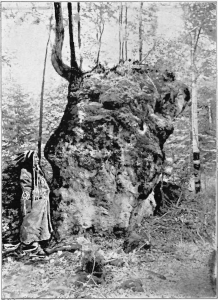
FRIENDSHIP’S ALTAR.
Upon a height the “Altar” stands,
Where once there gathered dusky bands
In days of long ago.
’Twas here their teacher daily stood,
Beside this “Altar” in the wood
His knowledge to bestow.
He lessons gave the gathered band
In tilling soil and planting land
With crops of maize or wheat.
He taught them arts of land and sea,
And told them of the maple tree
With stores of sugar sweet.
He taught them how to make the dart,
And aim it at the shy deer’s heart
Before it left the bow.
With wonder deep, and awed amaze,
They watched its flight with staring gaze
And saw it pierce a doe.
He taught them skins to cure and dress
To cover their wild nakedness—
This man of ancient fame.
He made for them the birch canoe,
To buoyant skim the waters blue
In quest of sport or game.
He wove for them a fishing net
To set in lake or rivulet
Beneath the water’s ebb;—
And for a pattern of the snare
He pointed down ’midst tangles where
A spider spun its web.
And, flocking there to hear his words,
There daily gathered scores of birds
Of every kind and shade;
“My Little Brothers” was the name
He gave these flocks that daily came
And sweetest music made.
The season passed, and moons went by—
Still by his “Altar” towering high,
The noble leader taught;
And some progressed in skill and arts
Till others envied in their hearts
And mischief thus was wrought.
The implements of sport and chase
Were used in war, as race met race—
And stained with gory red.
The teacher sad, and grieving stood
Beside the “Altar” in the wood,
At last he kindly said:
“I came among you arts to give
Of how to work and how to live,
In wise and perfect life.
Waste not the time in battle’s fray,
But live in friendship from to-day,
And cease this cruel strife.”
They heeded not his gentle speech,
And broke the laws he strove to teach
To them in kindest words:
And one by one they dropped away,
Until at last, one summer day—
There only came the birds.
He sadly turned and faced them all,
And smiled upon them, great and small,
And forth they burst in song.
Then hushing all the gathered band,
As close they flew on ev’ry hand,
He thus addressed the throng:
“My task, ‘My Brothers’ is complete;
I journey forth new tribes to meet;
But I will come again.
Your part will be to sing each day,
To cheer along the earthly way
The plodding feet of men.
“All sing to them of life ahead,
Beyond the dwellings of the Dead,
For whom they mourn and weep;
And tell them I will come once more
From out the land, beyond the shore
Across the waters deep.”
He quickly climbed the “Altar’s” height,
And, trailing down a ladder white
Of floating tendrils swept;
He stepped upon the magic vine,
That high in cloudland seemed to twine,
And swiftly upward leapt.
Along the ladder, toward the blue,
He quickly faded from the view
Of all the gathered throng.
And as he vanished from their eyes
Is radiant clouds of waiting skies,
Each sang a different song.
And, day by day, by forest shrine,
They watched to see the trailing vine,
Come sweeping down once more.
Their tryst was vain. They scattered wide
And sought for him o’er land and tide,
Far from the Island’s shore.
The hawks and falcons soared on high
To seek his dwelling in the sky,
Within the cloudlands fair;
The eagle then with stronger flight
Winged upward far from mortal sight
In regions of the air.
Petrels and gulls, on tireless wing,
Flew o’er the deep with dipping swing
Of teacher kind to learn.
While, swimming on the water’s breast,
The wild fowl, floating in the quest,
Were joined by teal and tern.
The loon dove down beneath the waves
To search in deeply hidden caves;
And as in days of yore—
The song-birds warbled songs of praise
Taught to them in departed days,
Upon the Island’s shore.
One bird there was who could not sing,
Nor cleave the air on tireless wing,
Nor breast the water’s foam;
The partridge had to stupid wait,
With naught to do but mourn his fate,
Within his thicket home.
At last he said, “I’ll build a boat,
Across the sea to swiftly float,
Our absent friend to find.”
He started then with utmost speed
To build a craft to meet his need,
And suited to his mind.
The birds are seeking to this day,
O’er land or sea, in their own way,
To find the man of Good.
And still the drumming sounds betray
The partridge as he works away
Within the silent wood.
The Red Men say this Guide once more
Will seek his “Altar” near the shore,
From out his cloud-walled plain;
He only waits to arrows make
Sufficient to each white life take
Before he comes again.
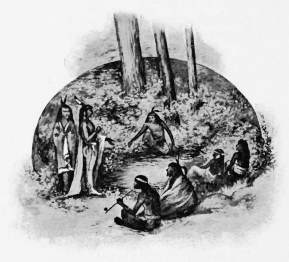
Have you heard of the fabled Spring so cold,
Where the sad pine trees are growing?
The clearest Spring that was ever seen,
Bursting forth ’midst the bordering green.
Where one might quaff, and forever dream
By its waters softly flowing?
’Tis not in the realm of the Gilded One
By the Ocklawaha’s tangle;
Not the silver spring with shining sand,
Hid ’midst the wilds of the far southland,
Where the dark palmettos thickly stand
In jungles where wild beasts mangle.
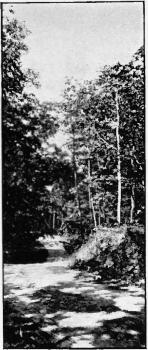
But ’tis far away on a Northern Isle
Is this Spring of ancient story,
Deep in the wood flowed its waters sweet,
Where paths were worn by the red man’s feet
For here, as the sun set, they would meet
To tell of the chase, the glory.
Oh, Nature, why shelter thy red son’s way,
To him all thy secrets giving;
Of woods, the streams, and the changing sky,
Or the eagle soaring far on high,
While we pass thy marvels blindly by?
Lead us closer to thee in living!
A wonderful secret this clear Spring had,
Hidden deep by shade and boulder.
If each new moon they would seek its brink,
And its purling waters freely drink,
From weak old age they need never shrink—
For never would they grow older.
And they brought their gifts and cast them in
For the Turtle God there sleeping:
Rings, and arrows, and peace pipes of reed,
Gifts made from the snowy wampum bead,
And all things a Turtle God might need
Were offered there for his keeping.
But all this happened in the far-off days,
When by old tradition’s telling,
Were all of the hills and valleys deep,
And each sylvan vale and rocky steep.
And murmuring spring, and cascade’s leap
Some spirit’s deep-hidden dwelling.
But those old days of peace flew quickly by,
And came the loud din of battle.
Above the charmed Spring upon the plain,
They met, and struggled with might and main;
There were groans of death and cries of pain,
And wild battle’s ceaseless rattle!
And many were slaughtered upon that time,
In their own red life blood lying;
And some crept feebly down the hill
Their slowly stiffening hands to fill,
To slacken their death thirst at the rill
Before they fell forward dying.
From that baleful time when the dying came
Down among the pines and myrtle,
In the quiet cool, to fainting sink,
As they feebly bent above to drink.
There vanished forever from the brink
The charmed spirit of the Turtle.
The Spring you would pass unknowing to-day,
For gone are the shade and boulder;
All cleared away by the white man’s hand
But a few old scattered cedars stand
Where once there gathered a chieftain band
To quaff and never grow older.
But it bubbles forth to this very day,
Where a few lone trees are growing,
Just at the foot of the sloping hill,
But the breath of death is in it still,
For its waters run forth icy chill—
Those waters so softly flowing.
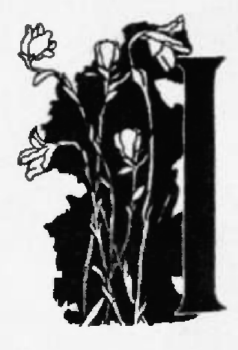 walked o’er an Isle by the North Seas swept,
walked o’er an Isle by the North Seas swept,
Where never a sound of the great world crept
Into its solitudes; and I thought the while
Of the weary discord, the pomp and style
In the world outside. As I looked at the trees
Sighing soft and low in the gentle breeze;
At the flowers low clustering at my feet,
Shedding here in secret their fragrance sweet—
I thought, were it not a far better part,
To learn thy sweet lessons—Oh, Nature’s heart;
Than to garner in wealth of worldly store,
And hunger, and labour, and thirst for more
That we must leave behind?
When we go forth
Into the Great Unknown, what is their worth?
All the world lost to me—my heart in tune
With the whispering trees and the flowers abloom,
I wandered on. The silent forest wide
Held me, a willing captive, on every side.
A small glade lay before me moist with dew,
For the ardent sun could not get through
The leafy dome. How pure the air, and sweet;
And how cool the moss to my straying feet.
Here I sank to rest by a mighty stone,
Perchance by the great Man-a-boz-ho thrown
At Key-bey-on, his sire; when, silvery white,
A cluster of “Ghost Flowers” met my sight;
And so pale, waxen white, these blossoms were,
That they seemed like some wraith from its sepulchre,
Not the faintest colour marked their gleam,
And they stood like the flowers in a dream.
With wonder I gazed on each waxen head,
For, while living and blooming, they still seemed dead;
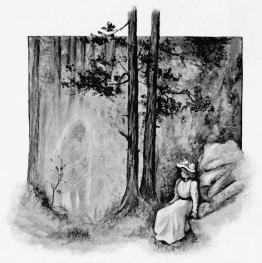
Wraiths seeking their tomb in the chilly ground
They seemed, drooping their heads o’er the mossy mound.
There I sat and watched them, as still as they,
For it seemed that a breath would waft them away.
How still the woods; not the call of a bird
Or the hum of an insect; no branchlet stirred.
Long, long I sat in this green mossy seat,
When I saw a mist at the “Ghost Flower’s” feet;
A mist that arose, and then sank from view;
But again it appeared, and higher grew,
And widened. Then, to my fear and amaze,
An Indian Chief met my startled gaze!
But his eyes beamed kind from his painted face,
And all the fear of the Red Man’s race
Left me. Hark! He spoke; and his voice was low
As of bubb’ling streamlets in their flow;
And, though ’twas a language I had not heard,
I understood clearly his slightest word.
But, hark! “Maid so white, have no fear of me,
But, list to the story I tell to thee!
For Pe-bo-an, the icy Winter old,
Many long moons o’er my lodge so cold
Has piled his great snow-drifts deep and high
All about the small wigwam where I lie;
So, maiden so white, have no fear of me;
But hark to the story I tell to thee:
Many moons has Nif-fon, the Summer fair,
Scattered flowers above me, slumbering there;
This mis-ko-deed, and the ‘Ghost Flower’ white,
Have marked my lodge through the Summer night.
Wherever you see a ‘Ghost Flower’ grow,
Know that some Warrior is sleeping below;
So tread not rude on his unmarked grave,
Where the ‘Indian Pipes’—the ‘Ghost Flowers’ wave.
I, the richest Warrior of my race,
Was so cold with pride, that my haughty face
Made all tremble.
But, now I longed to gaze
At my piled-up wealth, in those far-off days.
But, stern Pau-guk whispered that I must go
To his Hunting Grounds, from my wealth below;
And, as Death is stern, and must be obeyed;
I called all my people who were afraid
To disobey; then, I this council gave;
‘Bury all of my riches in my grave!’
With my feet to the east, they laid me here;
With my wampum, my arrows, and hunting gear;
And they packed in my narrow wigwam bed
Skins of bison, and bear around my head;
And their weight is so great, that here I stay,
For I cannot lift the burden away!
My brothers have long reached the Hunting Ground,
Where the Great Good Master of Life is found;
But here I lie, burdened with my load,
And the camp fires out on the ‘Spirit Road.’ ”
A bright ray of light pierced the leafy dome,
And I sat in the stillness there—alone!
As a mist slowly sinking away from sight
In the cold damp earth by the “Ghost Flowers” white,
He went! Like the spray that is blown from the sea;
And a hush I could feel, enveloped me!
Then, I slowly turned front my green mossy seat
But only the flowers my eyes did meet!
Was it a pale wraith I saw that day?
Or was it some trick of a wild dream’s play?
But I left the spot with conviction deep,
That under the flowers did a Warrior sleep;
And I ne’er see a “Ghost Flower” lift its head,
But I think it grows on the grave of the dead.
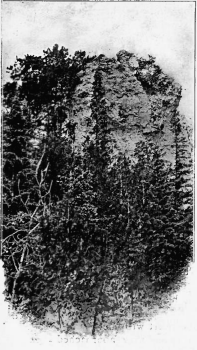
The O-me-me, the wood pigeon, called low his plaintive note,
’Twas echoed by his partner from her glossy pale-gray throat:
And a maiden’s head was lifted, as off across the hill
Came the call, thrice repeated, of a distant whip-poor-will.
One instant she stood list’ning, with hand upon her breast—
How lithe was she, and slender, in embroidered buckskin dressed;
Then poising slightly forward, from without her dusky throat
She answered, as the wood dove had, the thrice-repeated note.
As the call was softly echoed, the leaves were thrust apart,
And her lover, pale with fasting, quick clasped her to his heart.
“My fast is done, U-lis-ke, and thrice did there come to me
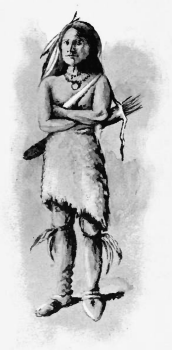
A Man-i-to of battle—so a chieftain shall I be;
He came in form of Kingfisher to my lone wigwam door—
He will be my Man-i-to when I leave this Island’s shore;—
For to-night I call my warriors—we go at break of day
To meet tribes of enemies many long moons away.”
“Oh must you go, Gen-ew-e-gon? The time will weary be,
I have waited days here, lonely, for you to come to me!”
“Ne-ne-moo-sha, ah, my sweetheart, I must go far away,
All would taunt me, call me woman, if longer I delay.
Hark, U-lis-ke, weep not, and listen, dear one, now to me
While I tell thee of the visions, which thrice mine eyes did see.
’Twas at the time of midnight, as I lay in slumber deep,
‘The-Old-Woman-That-Makes-The-War’ awoke me from my sleep!
Her mantle was scalps of women, her staff the heads of birds,
All singing various songs in gay concert with her words;
Stern was her face, and haggard, as she slow approached my bed,
Her voice like Evil Spirits, as she shook her staff and said:
‘Thy long fast to-night is ended, and the time has come to thee
When thou shalt be a chieftain; now hearken awell to me!
Sail to Ish-Kwan-Da-i-me-ka, the keeper of the gates,
The ruler of the gate-ways on all of the mighty lakes.
And when thou pass his lodge gates with thy noble warrior band,
Gather scalps and wealth in plenty from thy tribe’s rightful land!’
And fierce she shook her war staff, while uttering every word,
And following, song after song, chimed in each kind of bird.
Then taking from among them a Kingfisher bird of blue,
She said—‘I give this bird so strong as Man-i-to to you!
Wear proud his tuft of feathers, high upon thy chieftain’s crest;
Now if thou disobey me, may my curses fill thy breast!’
Thus three times she came to me, and this self-same council gave,
And told me where to journey, far beyond the Big-Sea-Wave.
So must I call my warriors, with them all to break my fast,
Meet me, U-lis-ke, sweetheart, on this bluff when day is past.
This morn I saw an eagle sailing high above the sea,
And by his flight he told me, I shall victorious be.”
“Gen-ew-e-gon, I’ll meet thee, but my heart is aching sore,
I fear, my noble chieftain, I shall never see thee more!”
He summoned all his warriors and they listened to his words,
Of the fierce “War-Woman” telling—with staff of singing birds;
They hailed him mighty chieftain, when he showed his bright blue crest,
He sat and planned the battle till the red sun sank to rest.
Then in the war dance joining round the camp fire’s blazing light,
Their wild songs and ringing war-cries rose high upon the night.
And as they launched their che-mauns on ripp’ling moonlit tide,
The chieftain donned his crest of blue and sought U-lis-ke’s side
And though he longed for battle, he forgot the chieftain’s crest,
As he smoothed the dusky tresses laid close against his breast.
He whispered—“I’ll return, love—breathe a spell upon my bow,
That my aim be sure in battle, I slay my every foe.
Ne-ne-moo-sha, when returning, this tow’ring cliff I see,
Waiting, may I find thee, love, here alone to welcome me.”
From hiding in her bosom, forth she drew a strand of hair,
Close-joined with snowy agate, gleaming like some crystal rare;
This about his shoulders clasping as in grief he bent his head,
A kiss she pressed upon his forehead, burst into tears and fled.
On the height he stood alone with the charm upon his breast,
The night breeze softly fanning the spot her lips had pressed.
The mist lay on the waters, when at dawn they sailed away;
On dewy laden branches, waking birds proclaimed the day!
On the cliff stood U-lis-ke, there she saw them leave the sand,
Her lover in his che-maun, leading all the painted band:—
But every paddle rested when they reached the waters deep—
This chant of supplication floated up along the steep.
[1]“Oh, hear us, Thou Great Good Spirit—you who have made this lake,
Hearken to us, your children, for we ask you now to take
Care of us on our journey. Keep all the great waters calm
Till we pass them o’er in safety.” Then gay they floated on
After dropping in their off’rings of beads or wampum bright;
He watched the cliff, she his barque, till distance dimmed their sight.
They left the “Turtle Island” in the balmy moon of flowers,
And to the maiden lonely, slowly passed the waiting hours:—
But she worked on beaded garments to grace her wedding day,
Her fancy ever following her lover far away.
And with the hand-wrought flowers and quills of gaudy hue,
She wove in sweetest mem’ries of that absent lover true.
Thus went by the days of summer, the autumn nights grew chill,
And maples ’mong the cedars, turned crimson on the hill.
Then came the moon of fruitage, bringing forth her winter store—
U-lis-ke watched the waters from the cliff above the shore.
Five moons had filled and faded when U-lis-ke on the steep
Stood alone one early morning, looking out upon the deep.
Fog lay thick upon the waters, mists ghost-like cold and white,
The distant waters hiding from her longing tear-dimmed sight.
Long she stood there silent, watching, when from the gathered gloom
Came discordant crying of a weird, ill-omened loon.
Came toward her slowly flying, poising on its mist-wet wing;
And hov’ring low, seemed saying—“I to you a message bring
From Gen-i-we-gon, thy lover, who sailed across the tide,
Vain is thy watch. U-lis-ke, he’ll ne’er journey to thy side.
He sits on field of battle leaning back against a tree,
Looking toward the hostile country with eyes that do not see.
A tuft of bright blue feathers waves upon his chieftain’s crest,
His trusty bow is leaning close against his silent breast.
His warriors are returning—hear you not their distant cry?
The mists their forms are hiding as they onward swiftly fly.
Now farewell—poor U-lis-ke.” Then he fluttered from her side.
She gazed with eyes of anguish off across the misty tide,
A faint chant from the waters near and nearer drew
And from out the fog white clinging, they paddled into view.
With wild eyes madly gleaming, she looked down upon the boats;
Their sa-sa-kwan, their war-cry, up the rocky hill-side floats:
“We have met, fought and conquered, the strong and the brave,
See the eagle plumes nod, and the red trophies wave!
We have fought like our fathers, and scorn to be slaves—
The sons of a noble race, scorn to be slaves!
And he, where is he, who led on to the fight,
Whose arrow was death, and whose war club was might?
He sits on the battle-field facing the foe,
Still wearing his blue crest, and holding his bow!
We fought like our fathers, and scorn to be slaves;
The sons of a noble race scorn to be slaves!”
She seemed to see the battle-field across the waters drear—
Seemed to see Gen-i-we-gon as their death chant smote her ear.
“Gen-i-we-gon, I’m waiting on the cliff above the sea—
Just as you bid me, sweetheart, here alone, to welcome thee!”
As wildly she was calling for the lost Gen-i-we-gon,
From the waters far below her, the death chant sounded on.
“Let all men mourn and weep. Oh, weep for the dead,
He sleeps on field of battle, his war crest on his head.
Oh, let your hearts be sore for him. Let all eyes weep.
We were once a mighty people. Oh, sorrow long and deep.
All our hearts are as one heart. Oh, weep for the dead.
He sleeps upon the battle-field, his war crest on his head.”
They passed the rock, high-towering, where she his brow had kissed;
Their chant grew faint and fainter as they vanished in the mist.
Then her voice arose in anguish “My heart is torn with pain,
To know thee silent sitting where the chilling autumn rain
And icy snows of winter will be drifting o’er thee free!
Oh, Gen-i-we-gon, my sweetheart, I die for love of thee!”
And e’en as she was calling, to her side there swiftly flew
A bird with medal on his breast and crest of vivid blue.
It circled slowly round her, then perched upon a tree—
It was a Kingfisher of blue—a ke-ske-mun-i-see!
It poised upon a bending bough with sad and solemn cry,
And gazed at her quite fearlessly with bright and piercing eye.
She looked with eyes of wonder at the fearless crested bird,
She spoke to him in words of love, as though he knew and heard.
“Thou hast heard my voice of anguish, my cry of wailing woe
And hastened here to meet me in the form of Man-i-to!
Gen-i-we-gon, I know thee! Thou hast journed here to me
And thou wearest on thy bosom the charm I gave to thee!
I know thee by the medal there upon thy painted breast!
I know thee by the eagle eye that gleams beneath thy crest!
Thou look’st at me so knowingly, wilt thou point out the road
Where I may find thee as thou wert? Oh, to thy new abode
I too, would come, Gen-i-we-gon, my lover bold and true,
There to find thee as a Chieftain and not a bird of blue!
Fly north, or south, or east, or west, thou Spirit Man-i-to
And wheresoever thou goest, I, thy own love, will go!”
An echo seemed repeated, faint and far across the hill,
The calling, thrice repeated, of a sad-toned whip-poor-will.
One moment did the Kingfisher to low bough closely cling,
One instant hovered ’round her, as though on aimless wing;
Then o’er the brink, straight downward, it fluttered from the steep.
She glided to the dizzy verge as one who walks in sleep.
She looked, with eyes unseeing, far across the misty sea;
Then murmured low—“I am coming, Gen-i-we-gon, to thee!”
Just one step more and on the rocks she fell from heights above!
And the spirit of U-lis-ke went forth to meet her love!
[1] The substance of these chants were taken from Schoolcraft.
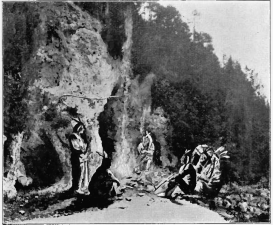
Swift skimming the waters that lapped on the sand,
Came many a chemaun from over the strand.
Some warriors thus landed in birchen canoe;
Some hastened through valleys all moistened with dew.
They came threading woodlands, and down pathways rough;
All seeking the foot of the towering bluff.
Here, glimmed a fire in a crevice of stone,
That, lighting the night, in a half circle shone.
The glow made each ripple to blush on the beach;
It strove, ever rampant, the cedars to reach.
It lit up the company gathered around:
Their shadows extended, lay on the ground.
The word had been issued to each Island brave
To meet with old Kenau that night by his cave.
For he, in his wanderings deep in the wood,
With the “Giant Fairies” had face to face stood.
So they came to hearken, this bronze, stalwart band,
To their coming victories over the land.
For the spirits who come from under the Isle,
With poor lonely mortal to linger awhile,
Endow him with power of the future to tell
And cast on his fellows a magical spell.
Old Kenau came forward, and into the flame
Cast tokens and herbs of a mystical fame;
The glow lit his features so withered and old,
And this is the story the old prophet told:—
“I, old Ken-au,
The Fairies saw
From the land of Chib-i-a-bos;
From caverns deep,
Where spirits sleep,
They stole forth like the wau-bos.
Up from the arch, the little arch,
The gateway to their dwelling,
’Neath sombre larch, with silent march,
They came, this story telling;
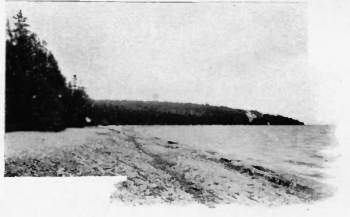
“Where wind and wave
The wide beach lave,
Where ‘Friendship Rock’ is standing.
Will many bands,
From distant lands,
Of white men make a landing.
And from the height, the rocky height
Will peal their speaking thunder;
And by its might, its flashing might,
Can rocks be torn asunder.
“Within the wood,
Where wigwams stood,
Will arise the white man’s city;
We graves will fill,
Upon the hill,
Unknown to strangers’ pity.
Nor through the glade, the hidden glade,
Will we seek the hare, the wau-bos;
Nor ’neath the shade, the bending shade
Will we catch the pike, jik-on-sis.
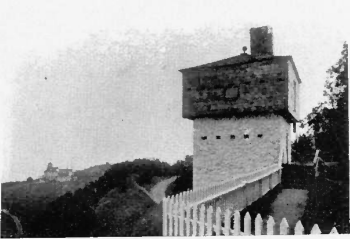
“The Wind of Snow,
Will blust’ring blow,
From out the northland blinding,
And search in vain,
O’er wood and plain,
Without a red man finding.
And in its breath, its freezing breath
Across the lands we cherish,
Will hasten death, cold, silent death,
And then will white men perish.
“The birch canoe,
O’er waters blue,
No more will skim the river;
No arrow high
Will cleave the sky,
From the fallen red man’s quiver.
Nor on the ledge, the rocky ledge,
Will we hunt the bear, the yek-was;
Nor in the sedge, the marshy sedge,
Will we hear the frog, da-hin-da.
“From sunset lands,
Of crimson sands,
Will come the West Wind blowing;
But on the shore,
We’ll walk no more,
Where the Sweet-Sea-Waves are flowing.
Nor on the wave, the heaving wave,
Will he haste our che-maun’s fleeting,
But in some grave, some silent grave,
Will he murmur o’er our sleeping.
“Neath bounding wave,
In hidden cave,
Will sleep some of our number;
The monster boat
Will o’er us float,
And ne’er disturb our slumber.
Nor in the wood, the shaded wood,
Will we hunt the deer—skan-o-do;
Nor on the flood, the bounding flood,
Will we catch the trout, do-a-to.
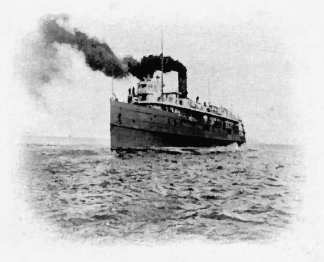
“From sunrise seas
The eastern breeze
Will breathe o’er dew-wet valley,
Or, damp and chill,
Across the hill,
With moaning pine trees dally.
Within the wood, the darksome wood,
Where camp-fires once were gleaming,
Or in the flood, the rolling flood,
He’ll find us silent dreaming.
“Ourselves forgot,
Our boats will rot,
And lie along the waters;
While we will sleep
The slumber deep,
With all our sons and daughters.
Nor on the lake, the shining lake,
Will we hunt the wild goose, wa-wa;
Nor through the brake, the bending brake,
Will we seek the wild duck, so-ra.
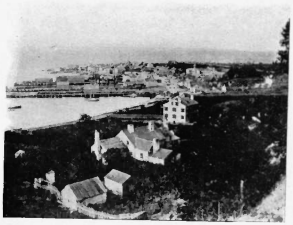
“The scented breeze,
From southern seas,
Will rouse us with its weeping;
And when we’ve found,
The ‘Hunting Ground,’
We’ll waken from our sleeping.
Beyond the sea, the sunset sea,
We’ll leave the strangers’ city,
And wander free, forever free,
Beyond his wrath, or pity.”
They silently left him there, chanting the tale,
To haste o’er the isle, or in che-mauns set sail;
Old ‘Mud-jee Mon-e-do’ was he from that night;
His camp-fire they shunned, for they said it could blight.
Poor ‘Mud-jee Mon-e-do,’ spirit of evil!
His message, they said, came from the devil.
Old Kenau has long viewed the fair “Hunting Ground,”
But still in the rock may his fire-place be found.
Grown thickly about with mosses and lichen,
It is known to this day, as the “Devil’s Kitchen.”
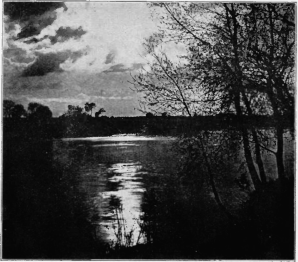
From his fragrant bowers of jasmine,
By the broad and deep lagoon,
Where magnolias shed their fragrance
Sweet upon the sultry moon;
Sha-won-das-see gazed to Northward,
Gazed with drowsy eyes grown bold
To where, standing on an Island,
Was a maid with hair of gold.
All day long he gazed upon her,
And at night he breathed her name;
Days passed by, and still she lingered,
Loit’ring on the grassy plain.
Green her robes as woodland fairy,
Bright her circling crown of hair;
Winning wanton straying sunbeams,
Holding them as captives there.
He, a suitor slow in wooing,
Content to watch her through the day,
And to lie in perfumed bowers
Dreaming moonlit hours away.
But one morn when he looked Northward—
What a spectre met his sight,
All her sunny hair had vanished,
And her head was crowned in white.
Then he moaned, and sighed in anger,
And a mist of silv’ry hue
Floated from her snowy head-dress,
And she faded from his view.
He, the South Wind, Sha-won-das-see,
Laggard lover, lazy scion;
She, the fair one on the Island,
Was the saucy Dandelion.
Ah, old South Wind, why so tardy?
Know you not that such gold fades?
Think you youth will last forever?
Sigh not so, but woo the maids.
Still your sighs to us are welcome
When your Northern sweethearts die;
Then your breath is Indian Summer—
So sigh, Sha-won-das-see, sigh.
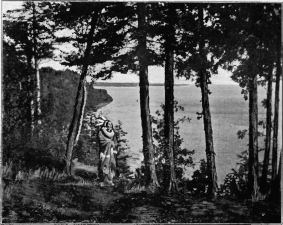
The sun sank low above the wave,
And in the waters seemed to lave
As though to wash the paint away
That stained his face with war’s array.
Until the light began to dim,
A warrior looked across the Strait
Upon the old fort, stern and grim,
And formed his plans of ruthless hate.
Alone his vigil there he kept,
Save where his dusky brothers slept;
Their battles fought and they at rest
Within the Island’s sacred breast.
The ruler he, this chieftain swarth,
Of all the red men in the North.
The night passed by, and from the Isle,
Upon the early morning’s smile,
Ascended smoke of sombre hue
Athwart the freshness of the blue;
It rose in dark, then lighter tone,
From gathered leaves in tuft and shock,
Arranged upon the lofty stone
Known to this day as “Chimney Rock.”
And every hue of murky stain,
To gleaming eyes of wood or plain,
Conveyed a language known to all—
That bid them answer to the call
Of Pontiac, their leader stern,
His stratagem of war to learn.
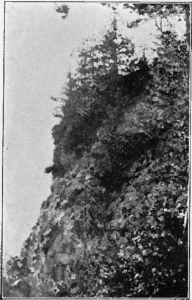
From isle to isle, from shore to shore,
The signs, repeated o’er and o’er,
Went speeding on from band to band
Of waiting tribes, through all the land.
The white men watched their gardens grow,
And gave a sigh of deep content;
Or told of battles long ago,
And read no signs of war’s ferment.
The soldiers lightened work with play
To pass away the lagging day,
Nor knew that cross the gleaming Strait
Keen eyes looked out with scheming hate,
As the Indian emperor, Pontiac,
Perfected plans of death and rack.
The time went by; the warriors came
In answer to the signal flame,
And dropped, for then, all tribal hate,
In banded strength their wrongs to sate.
No monarch ere upon his throne
Held greater dignity or sway,
Than on the cliff of unwrought stone,
Did Pontiac that fair spring day.
There were Wyandots, and Chippewas,
The Shawanese and Ottawas;
The Hurons bold, that warlike race,
With Delawares met face to face;
The Miami forgot his pride
And waited by the Mingo’s side.
Then Pontiac rose, dark and tall,
And thus addressed the warriors all—
“You Chieftains brave, from many bands,
Unite in strength your warring hands
To drive these wretches from our shore,
Who come with smiles but stay to cheat!
Who drive us from our own lodge door,
To trample us beneath their feet!
We fed them, and they took our land;
They drive us on—a severed band!
They brought with them the speaking gun,
And waters that like hot fire run.
With gifts like these, they buy our right,
And still we dare not turn and fight!
“Who said we dare not turn on them
And break them like a rotten stem!
Not you, my Chief! Nor you! Nor you!
No. They shall have from us their due!
They do not know the Indian Braves,
With wood and stream their heritage!
We never Chiefs, will be their slaves,
And sell to them our parentage!
They came and overpowered the French,
But they shall not the Red Man quench!
These lakes and rivers hold our food,
Put there by Man-i-to, the Good:
Shall we leave this—our chosen land?
Or strike to earth this Red Coat band!”
’Twas thus he roused them for the fray,
And then his plot before them lay;
Bold Pontiac’s conspiracy,
To gain their old supremacy.
Then forth they went through all the land,
With stirring words from tribe to tribe—
Arousing every Indian band
With Victory—the offered bribe.
And still the soldiers dozed away,
While nearer came the fatal day.
The settlers sang in fancied peace,
And praises gave for war’s surcease;
Or springing crop in girdled wood
Where gaily flocked their half-wild brood.
’Twas seventeen hundred and sixty-three,
When Chieftains came a game to see,
The fourth of June, the King’s birthday:
The game was ball—baggatiway.
The stakes were high ’twixt rival tribes;
The sport increased—the excitement grew,
They gave each other taunts and jibes,
While quick as thought the light ball flew.
It was not caught with dusky hand,
But back and forth, from band to band,
Was tossed with racket’s dext’rous play,
Hither and yon, in the game’s wild way,
As each strove to send it to the goal
Where stood his adversary’s pole.
The soldiers taking holiday,
Leave posts to watch the queer ball play,
For the spot to which the Red Men draw
Lies just without Fort Mackinac.
And all about the palisades
In gaudy blankets’ gay array,
Are gathered dusky squaws and maids
Intent upon the brisk affray.
Hither and thither, left and right,
Rivals follow the ball’s swift flight—
And now it rises high in air,
Beset by hundreds, fleet as hare,
It falls within the pickets high,
Pursuing it, the Warriors fly!
And now a clamour smites the ear,
That smothers all the former cheer!
It is the War Cries’ awful yell
Like fiends escaping out of hell!
From blankets gay of squaws and maids,
That mix among the maddened bands,
Are tomahawks and gleaming blades
Put into clutching ready hands.
And then they slaughter to their fill—
They scalp and torture, slash and kill!
They form their hands into a cup,
The flowing blood to greedy sup!
While mingled with the War Cries’ call
Are dying groans as white men fall!
Ruin and carnage ran that day—
From Northern lakes to Southern bay;
Beyond the Alleghany’s chain
Swept onward to the Western plain!
Bold Pontiac—the Pilot, led,
The white men fell like ripened wheat!
Through all that land the streams ran red;
Nine English Forts met swift defeat!
But few survived at Mackinac
To tell the awful sights they saw,
Another Fort looks ’cross the Strait,
Toward where the red men wrought their hate
To gain their old supremacy
In Pontiac’s conspiracy.
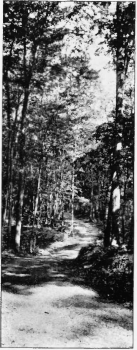
Gone from the mountain,
Fled from the valley—
Our Summer, with bright trailing robes of green.
Where hast thou journeyed?
To climes Elysian,
Far, far where mortal eyes never have seen?
Faded thy blossoms,
Vanished thy songsters
Followed they all thy long journey afar?
Still dost thou hold them,
Safe in thy bosom
In some sunny clime where the Southlands are.
Thy realm is taken—
Ruled by a Sovereign
Who has cast a glamour over the land;
Her charms are present,
Thine are forgotten,
She is a Queen from an Indian band.
Thy woods are altered;
Thy glades and meadows
She has painted orange, scarlet and gold;
Her fruit-scented breath
From orchards is stealing—
The breath of the Indian Summer bold.
Her buckskin garments
Are decked out gaily
In colours dear to an Indian’s heart;
Her snares of gossamer
Mortals beguiling—
Are cobwebs fashioned with exquisite art.
Smoke from her wigwam
Obscures the distance,
And casts hazy shadows over the land;
Her bright witchery
Over me stealing
Makes her a Queen I can scarcely withstand.
Her fetters I’ll loosen,
And haste to the Southland;
Treacherous Queen is this Indian bold;—
She would hold me enthralled
Until I was captive
Within the White Realm of the Ice King cold.
I’ll search in my journey,
For some spot of beauty
Where birds, leafy hidden, warble their song;
Where balmiest breezes
With fragrance are laden,
And a murmuring streamlet wanders along.
Mis-spelled words and printer errors have been fixed.
The old printing in this book had a lot of drop-outs. Commas and periods; colons and semi-colons were frequently hard to determine, and have been corrected based on the similar lines in the poem.
Stanza breaks between pages were also hard to determine, and have been done based on the rest of the poem.
Illustrations have been relocated due to using a non-page layout.
Some photographs have been enhanced to be more legible.
[The end of Legendary Lore of Mackinac by Lorena M. Page]